The Role of Values and Ethics on Counseling
VerifiedAdded on 2022/12/29
|26
|6599
|32
AI Summary
This article discusses the significance of values and ethics in counseling and their impact on the counseling process. It emphasizes the need for counselors to avoid imposing their personal beliefs on clients and maintain a neutral position. The importance of self-reflective strategies for counselors to evaluate their actions and seek help when needed is also highlighted.
Contribute Materials
Your contribution can guide someone’s learning journey. Share your
documents today.
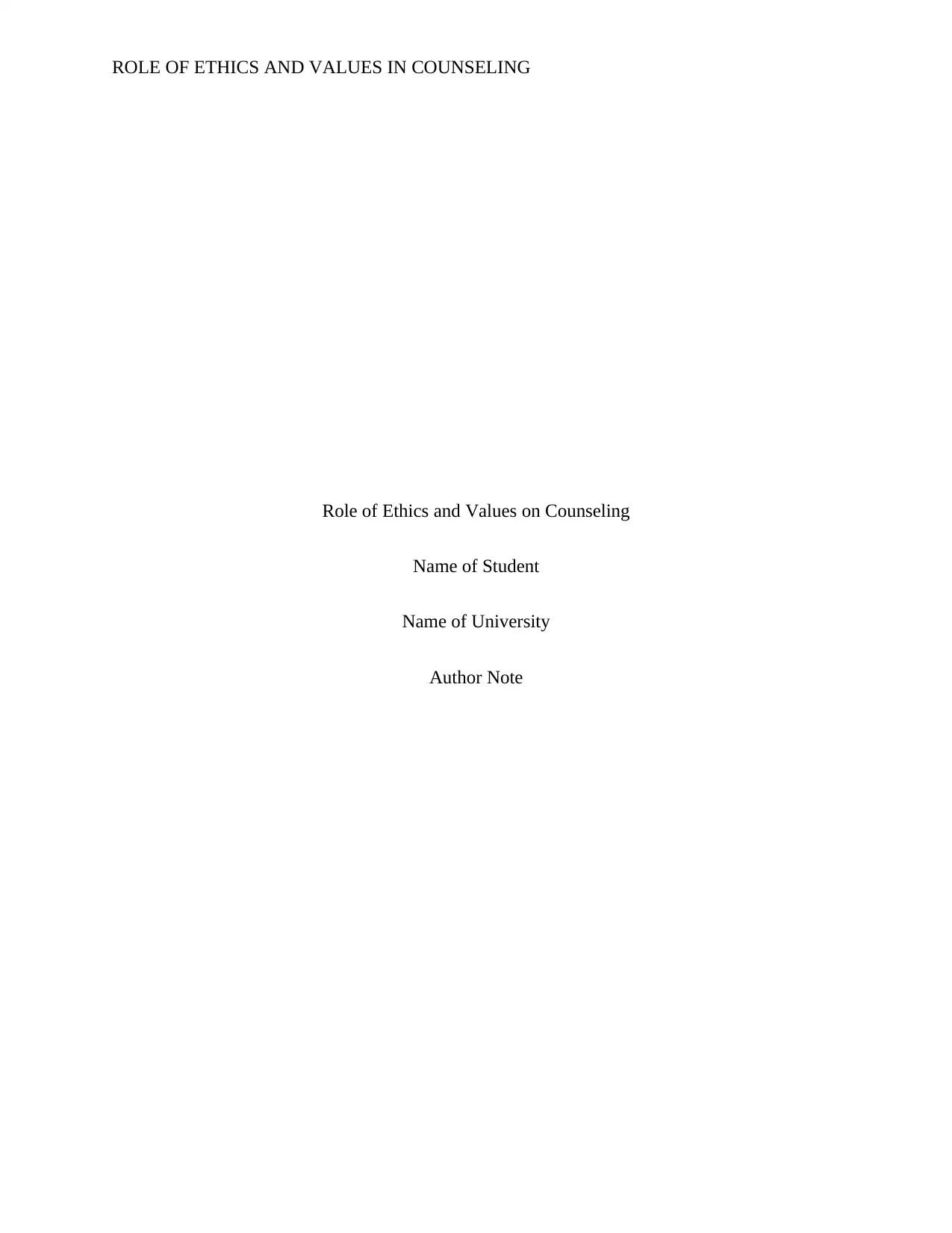
ROLE OF ETHICS AND VALUES IN COUNSELING
Role of Ethics and Values on Counseling
Name of Student
Name of University
Author Note
Role of Ethics and Values on Counseling
Name of Student
Name of University
Author Note
Secure Best Marks with AI Grader
Need help grading? Try our AI Grader for instant feedback on your assignments.
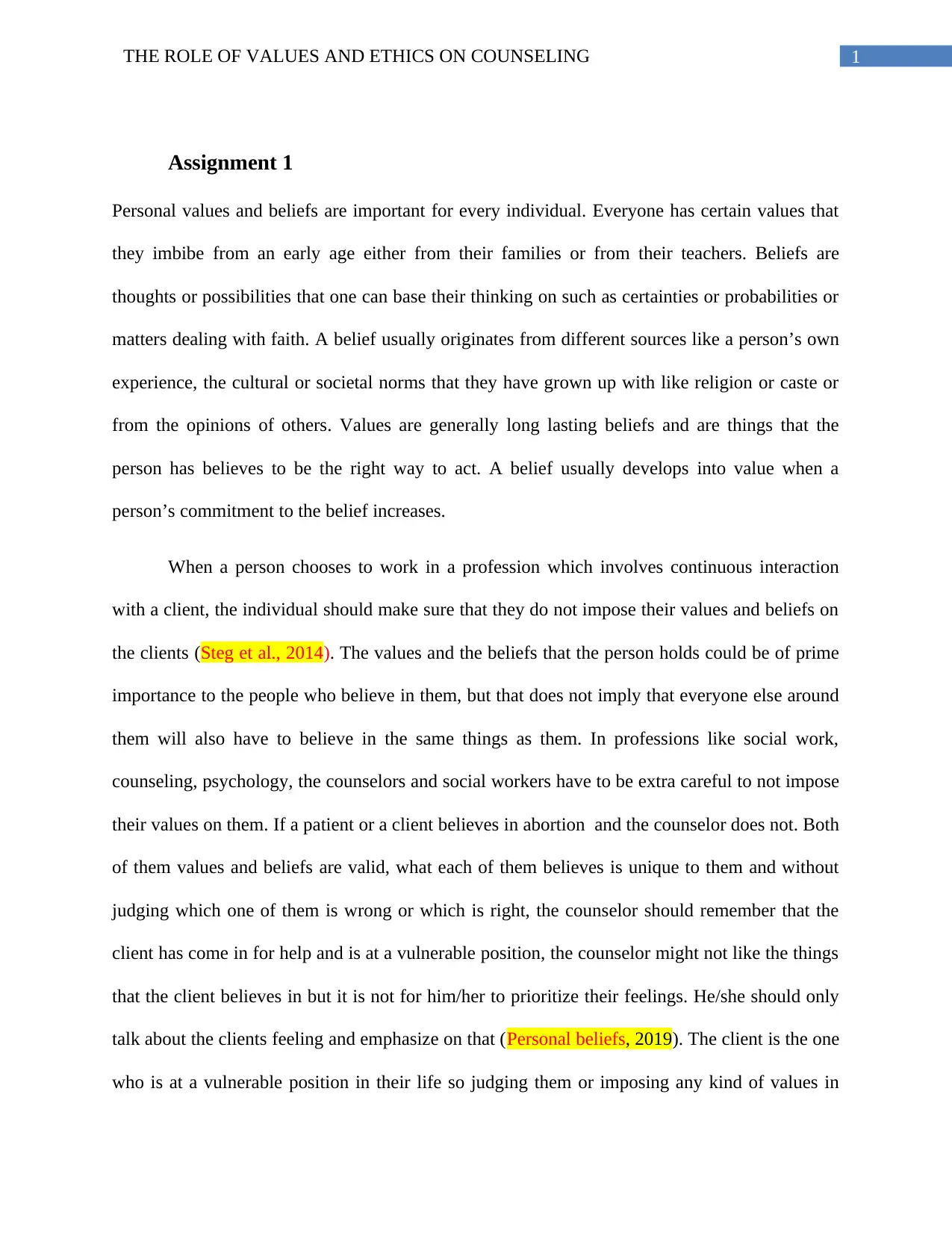
1THE ROLE OF VALUES AND ETHICS ON COUNSELING
Assignment 1
Personal values and beliefs are important for every individual. Everyone has certain values that
they imbibe from an early age either from their families or from their teachers. Beliefs are
thoughts or possibilities that one can base their thinking on such as certainties or probabilities or
matters dealing with faith. A belief usually originates from different sources like a person’s own
experience, the cultural or societal norms that they have grown up with like religion or caste or
from the opinions of others. Values are generally long lasting beliefs and are things that the
person has believes to be the right way to act. A belief usually develops into value when a
person’s commitment to the belief increases.
When a person chooses to work in a profession which involves continuous interaction
with a client, the individual should make sure that they do not impose their values and beliefs on
the clients (Steg et al., 2014). The values and the beliefs that the person holds could be of prime
importance to the people who believe in them, but that does not imply that everyone else around
them will also have to believe in the same things as them. In professions like social work,
counseling, psychology, the counselors and social workers have to be extra careful to not impose
their values on them. If a patient or a client believes in abortion and the counselor does not. Both
of them values and beliefs are valid, what each of them believes is unique to them and without
judging which one of them is wrong or which is right, the counselor should remember that the
client has come in for help and is at a vulnerable position, the counselor might not like the things
that the client believes in but it is not for him/her to prioritize their feelings. He/she should only
talk about the clients feeling and emphasize on that (Personal beliefs, 2019). The client is the one
who is at a vulnerable position in their life so judging them or imposing any kind of values in
Assignment 1
Personal values and beliefs are important for every individual. Everyone has certain values that
they imbibe from an early age either from their families or from their teachers. Beliefs are
thoughts or possibilities that one can base their thinking on such as certainties or probabilities or
matters dealing with faith. A belief usually originates from different sources like a person’s own
experience, the cultural or societal norms that they have grown up with like religion or caste or
from the opinions of others. Values are generally long lasting beliefs and are things that the
person has believes to be the right way to act. A belief usually develops into value when a
person’s commitment to the belief increases.
When a person chooses to work in a profession which involves continuous interaction
with a client, the individual should make sure that they do not impose their values and beliefs on
the clients (Steg et al., 2014). The values and the beliefs that the person holds could be of prime
importance to the people who believe in them, but that does not imply that everyone else around
them will also have to believe in the same things as them. In professions like social work,
counseling, psychology, the counselors and social workers have to be extra careful to not impose
their values on them. If a patient or a client believes in abortion and the counselor does not. Both
of them values and beliefs are valid, what each of them believes is unique to them and without
judging which one of them is wrong or which is right, the counselor should remember that the
client has come in for help and is at a vulnerable position, the counselor might not like the things
that the client believes in but it is not for him/her to prioritize their feelings. He/she should only
talk about the clients feeling and emphasize on that (Personal beliefs, 2019). The client is the one
who is at a vulnerable position in their life so judging them or imposing any kind of values in
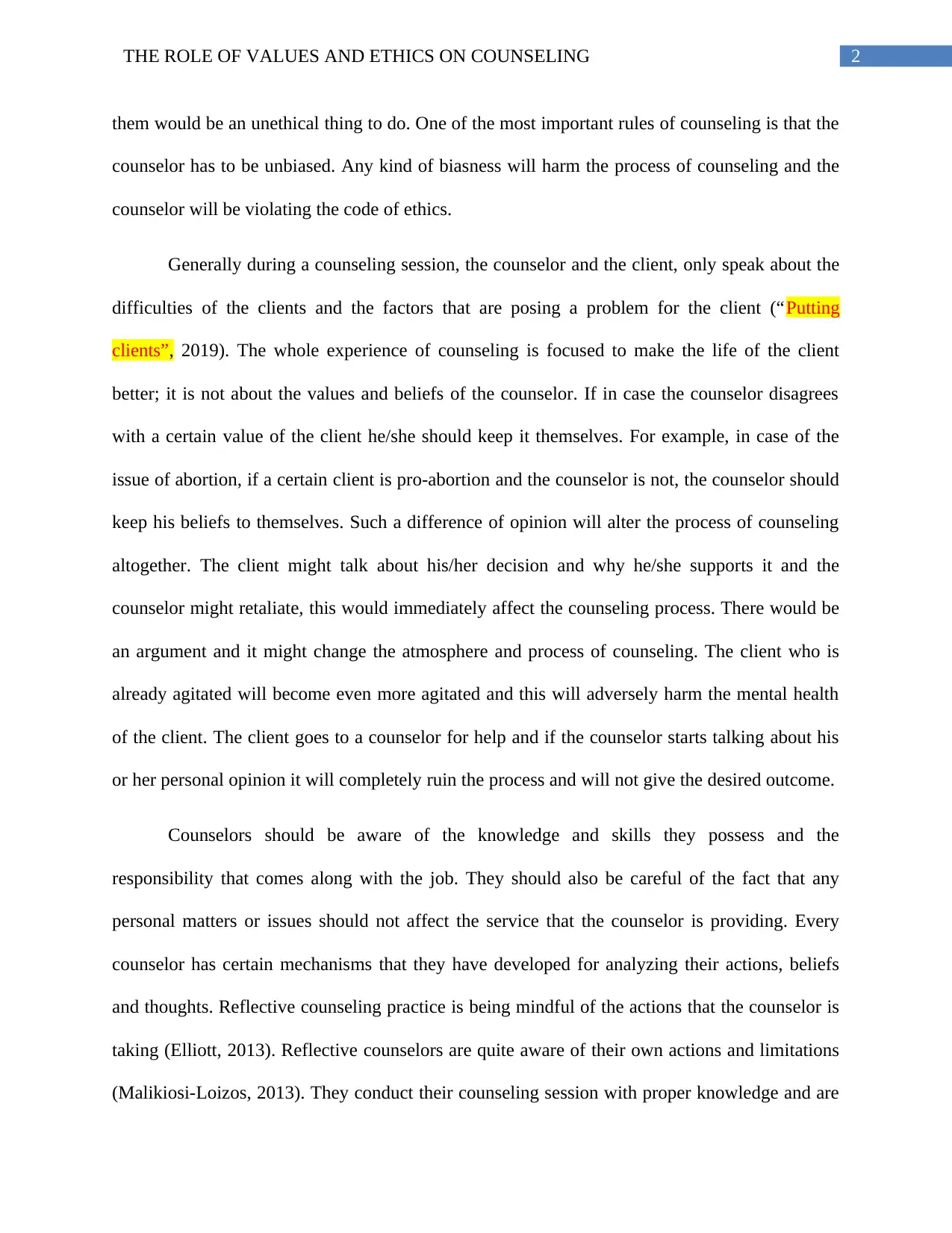
2THE ROLE OF VALUES AND ETHICS ON COUNSELING
them would be an unethical thing to do. One of the most important rules of counseling is that the
counselor has to be unbiased. Any kind of biasness will harm the process of counseling and the
counselor will be violating the code of ethics.
Generally during a counseling session, the counselor and the client, only speak about the
difficulties of the clients and the factors that are posing a problem for the client (“Putting
clients”, 2019). The whole experience of counseling is focused to make the life of the client
better; it is not about the values and beliefs of the counselor. If in case the counselor disagrees
with a certain value of the client he/she should keep it themselves. For example, in case of the
issue of abortion, if a certain client is pro-abortion and the counselor is not, the counselor should
keep his beliefs to themselves. Such a difference of opinion will alter the process of counseling
altogether. The client might talk about his/her decision and why he/she supports it and the
counselor might retaliate, this would immediately affect the counseling process. There would be
an argument and it might change the atmosphere and process of counseling. The client who is
already agitated will become even more agitated and this will adversely harm the mental health
of the client. The client goes to a counselor for help and if the counselor starts talking about his
or her personal opinion it will completely ruin the process and will not give the desired outcome.
Counselors should be aware of the knowledge and skills they possess and the
responsibility that comes along with the job. They should also be careful of the fact that any
personal matters or issues should not affect the service that the counselor is providing. Every
counselor has certain mechanisms that they have developed for analyzing their actions, beliefs
and thoughts. Reflective counseling practice is being mindful of the actions that the counselor is
taking (Elliott, 2013). Reflective counselors are quite aware of their own actions and limitations
(Malikiosi-Loizos, 2013). They conduct their counseling session with proper knowledge and are
them would be an unethical thing to do. One of the most important rules of counseling is that the
counselor has to be unbiased. Any kind of biasness will harm the process of counseling and the
counselor will be violating the code of ethics.
Generally during a counseling session, the counselor and the client, only speak about the
difficulties of the clients and the factors that are posing a problem for the client (“Putting
clients”, 2019). The whole experience of counseling is focused to make the life of the client
better; it is not about the values and beliefs of the counselor. If in case the counselor disagrees
with a certain value of the client he/she should keep it themselves. For example, in case of the
issue of abortion, if a certain client is pro-abortion and the counselor is not, the counselor should
keep his beliefs to themselves. Such a difference of opinion will alter the process of counseling
altogether. The client might talk about his/her decision and why he/she supports it and the
counselor might retaliate, this would immediately affect the counseling process. There would be
an argument and it might change the atmosphere and process of counseling. The client who is
already agitated will become even more agitated and this will adversely harm the mental health
of the client. The client goes to a counselor for help and if the counselor starts talking about his
or her personal opinion it will completely ruin the process and will not give the desired outcome.
Counselors should be aware of the knowledge and skills they possess and the
responsibility that comes along with the job. They should also be careful of the fact that any
personal matters or issues should not affect the service that the counselor is providing. Every
counselor has certain mechanisms that they have developed for analyzing their actions, beliefs
and thoughts. Reflective counseling practice is being mindful of the actions that the counselor is
taking (Elliott, 2013). Reflective counselors are quite aware of their own actions and limitations
(Malikiosi-Loizos, 2013). They conduct their counseling session with proper knowledge and are
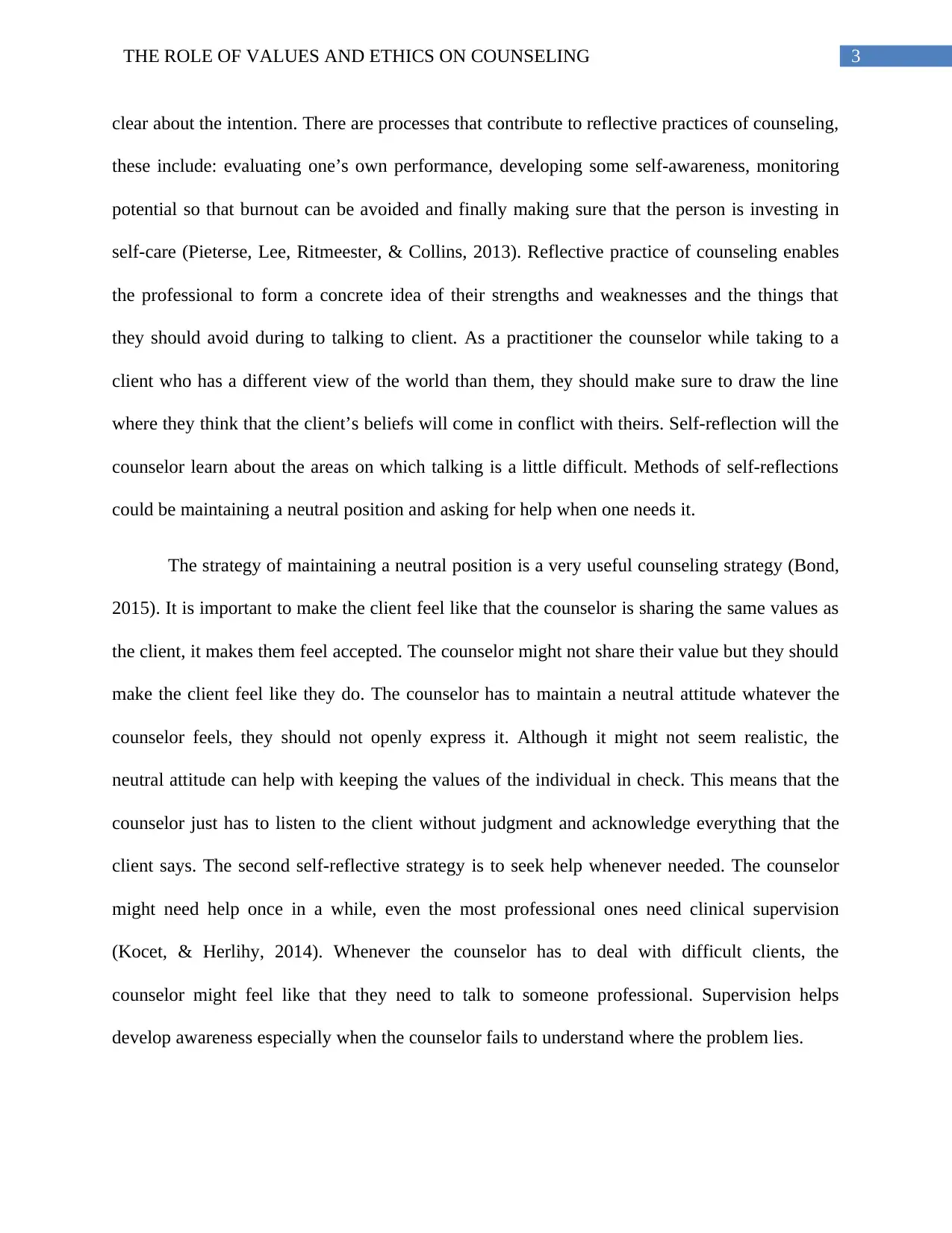
3THE ROLE OF VALUES AND ETHICS ON COUNSELING
clear about the intention. There are processes that contribute to reflective practices of counseling,
these include: evaluating one’s own performance, developing some self-awareness, monitoring
potential so that burnout can be avoided and finally making sure that the person is investing in
self-care (Pieterse, Lee, Ritmeester, & Collins, 2013). Reflective practice of counseling enables
the professional to form a concrete idea of their strengths and weaknesses and the things that
they should avoid during to talking to client. As a practitioner the counselor while taking to a
client who has a different view of the world than them, they should make sure to draw the line
where they think that the client’s beliefs will come in conflict with theirs. Self-reflection will the
counselor learn about the areas on which talking is a little difficult. Methods of self-reflections
could be maintaining a neutral position and asking for help when one needs it.
The strategy of maintaining a neutral position is a very useful counseling strategy (Bond,
2015). It is important to make the client feel like that the counselor is sharing the same values as
the client, it makes them feel accepted. The counselor might not share their value but they should
make the client feel like they do. The counselor has to maintain a neutral attitude whatever the
counselor feels, they should not openly express it. Although it might not seem realistic, the
neutral attitude can help with keeping the values of the individual in check. This means that the
counselor just has to listen to the client without judgment and acknowledge everything that the
client says. The second self-reflective strategy is to seek help whenever needed. The counselor
might need help once in a while, even the most professional ones need clinical supervision
(Kocet, & Herlihy, 2014). Whenever the counselor has to deal with difficult clients, the
counselor might feel like that they need to talk to someone professional. Supervision helps
develop awareness especially when the counselor fails to understand where the problem lies.
clear about the intention. There are processes that contribute to reflective practices of counseling,
these include: evaluating one’s own performance, developing some self-awareness, monitoring
potential so that burnout can be avoided and finally making sure that the person is investing in
self-care (Pieterse, Lee, Ritmeester, & Collins, 2013). Reflective practice of counseling enables
the professional to form a concrete idea of their strengths and weaknesses and the things that
they should avoid during to talking to client. As a practitioner the counselor while taking to a
client who has a different view of the world than them, they should make sure to draw the line
where they think that the client’s beliefs will come in conflict with theirs. Self-reflection will the
counselor learn about the areas on which talking is a little difficult. Methods of self-reflections
could be maintaining a neutral position and asking for help when one needs it.
The strategy of maintaining a neutral position is a very useful counseling strategy (Bond,
2015). It is important to make the client feel like that the counselor is sharing the same values as
the client, it makes them feel accepted. The counselor might not share their value but they should
make the client feel like they do. The counselor has to maintain a neutral attitude whatever the
counselor feels, they should not openly express it. Although it might not seem realistic, the
neutral attitude can help with keeping the values of the individual in check. This means that the
counselor just has to listen to the client without judgment and acknowledge everything that the
client says. The second self-reflective strategy is to seek help whenever needed. The counselor
might need help once in a while, even the most professional ones need clinical supervision
(Kocet, & Herlihy, 2014). Whenever the counselor has to deal with difficult clients, the
counselor might feel like that they need to talk to someone professional. Supervision helps
develop awareness especially when the counselor fails to understand where the problem lies.
Secure Best Marks with AI Grader
Need help grading? Try our AI Grader for instant feedback on your assignments.
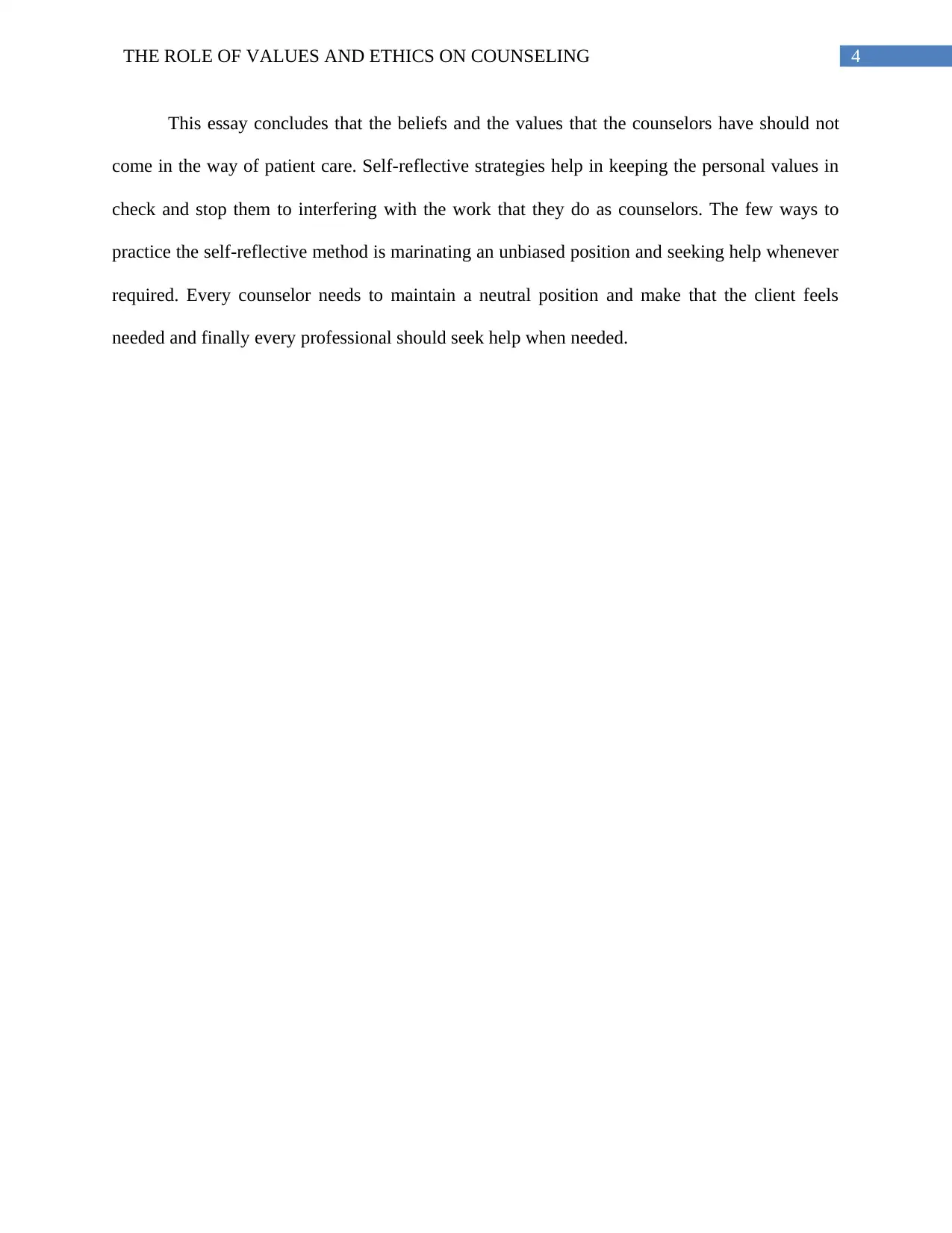
4THE ROLE OF VALUES AND ETHICS ON COUNSELING
This essay concludes that the beliefs and the values that the counselors have should not
come in the way of patient care. Self-reflective strategies help in keeping the personal values in
check and stop them to interfering with the work that they do as counselors. The few ways to
practice the self-reflective method is marinating an unbiased position and seeking help whenever
required. Every counselor needs to maintain a neutral position and make that the client feels
needed and finally every professional should seek help when needed.
This essay concludes that the beliefs and the values that the counselors have should not
come in the way of patient care. Self-reflective strategies help in keeping the personal values in
check and stop them to interfering with the work that they do as counselors. The few ways to
practice the self-reflective method is marinating an unbiased position and seeking help whenever
required. Every counselor needs to maintain a neutral position and make that the client feels
needed and finally every professional should seek help when needed.
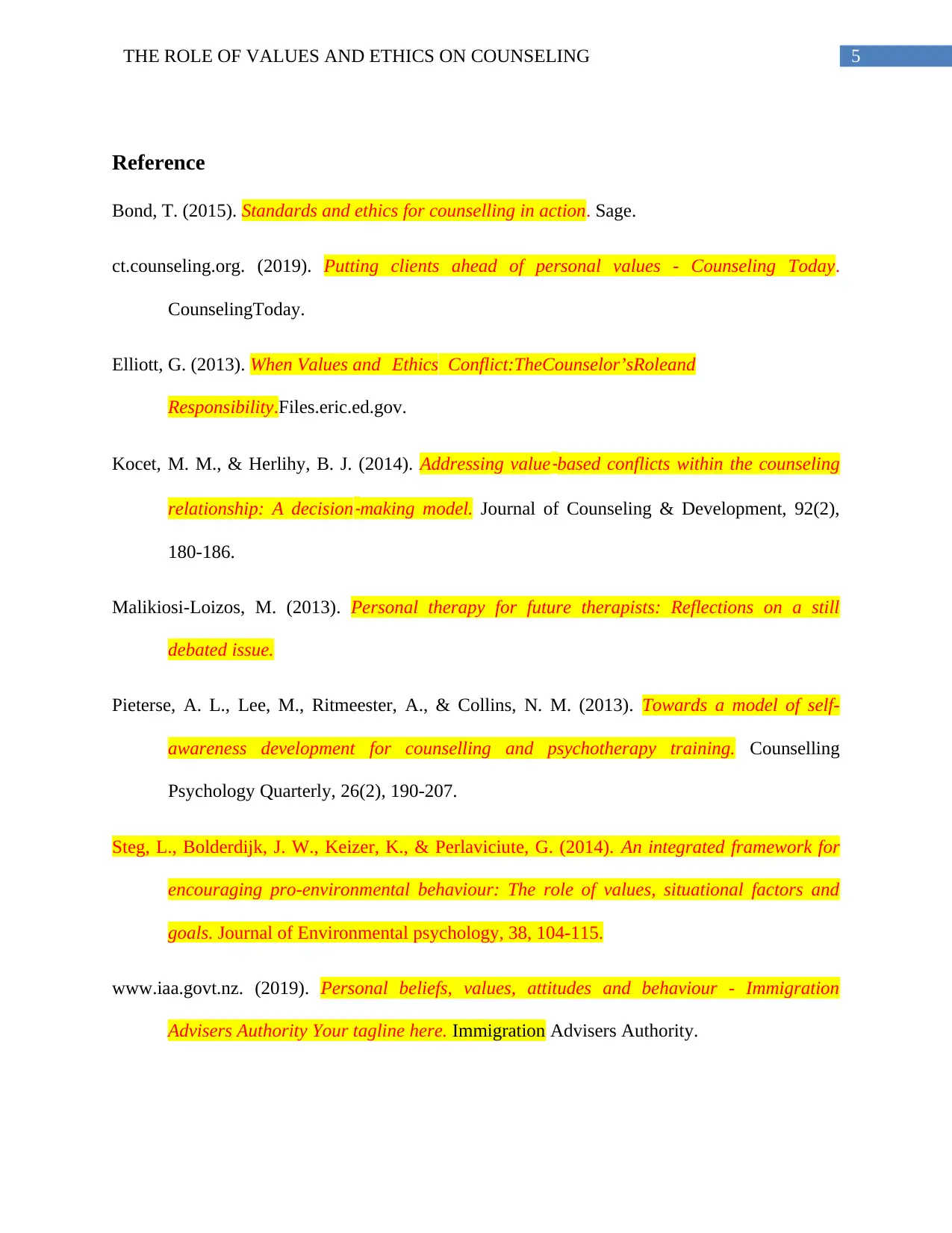
5THE ROLE OF VALUES AND ETHICS ON COUNSELING
Reference
Bond, T. (2015). Standards and ethics for counselling in action. Sage.
ct.counseling.org. (2019). Putting clients ahead of personal values - Counseling Today.
CounselingToday.
Elliott, G. (2013). When Values and Ethics Conflict:TheCounselor’sRoleand
Responsibility.Files.eric.ed.gov.
Kocet, M. M., & Herlihy, B. J. (2014). Addressing value
‐based conflicts within the counseling
relationship: A decision
‐making model. Journal of Counseling & Development, 92(2),
180-186.
Malikiosi-Loizos, M. (2013). Personal therapy for future therapists: Reflections on a still
debated issue.
Pieterse, A. L., Lee, M., Ritmeester, A., & Collins, N. M. (2013). Towards a model of self-
awareness development for counselling and psychotherapy training. Counselling
Psychology Quarterly, 26(2), 190-207.
Steg, L., Bolderdijk, J. W., Keizer, K., & Perlaviciute, G. (2014). An integrated framework for
encouraging pro-environmental behaviour: The role of values, situational factors and
goals. Journal of Environmental psychology, 38, 104-115.
www.iaa.govt.nz. (2019). Personal beliefs, values, attitudes and behaviour - Immigration
Advisers Authority Your tagline here. Immigration Advisers Authority.
Reference
Bond, T. (2015). Standards and ethics for counselling in action. Sage.
ct.counseling.org. (2019). Putting clients ahead of personal values - Counseling Today.
CounselingToday.
Elliott, G. (2013). When Values and Ethics Conflict:TheCounselor’sRoleand
Responsibility.Files.eric.ed.gov.
Kocet, M. M., & Herlihy, B. J. (2014). Addressing value
‐based conflicts within the counseling
relationship: A decision
‐making model. Journal of Counseling & Development, 92(2),
180-186.
Malikiosi-Loizos, M. (2013). Personal therapy for future therapists: Reflections on a still
debated issue.
Pieterse, A. L., Lee, M., Ritmeester, A., & Collins, N. M. (2013). Towards a model of self-
awareness development for counselling and psychotherapy training. Counselling
Psychology Quarterly, 26(2), 190-207.
Steg, L., Bolderdijk, J. W., Keizer, K., & Perlaviciute, G. (2014). An integrated framework for
encouraging pro-environmental behaviour: The role of values, situational factors and
goals. Journal of Environmental psychology, 38, 104-115.
www.iaa.govt.nz. (2019). Personal beliefs, values, attitudes and behaviour - Immigration
Advisers Authority Your tagline here. Immigration Advisers Authority.
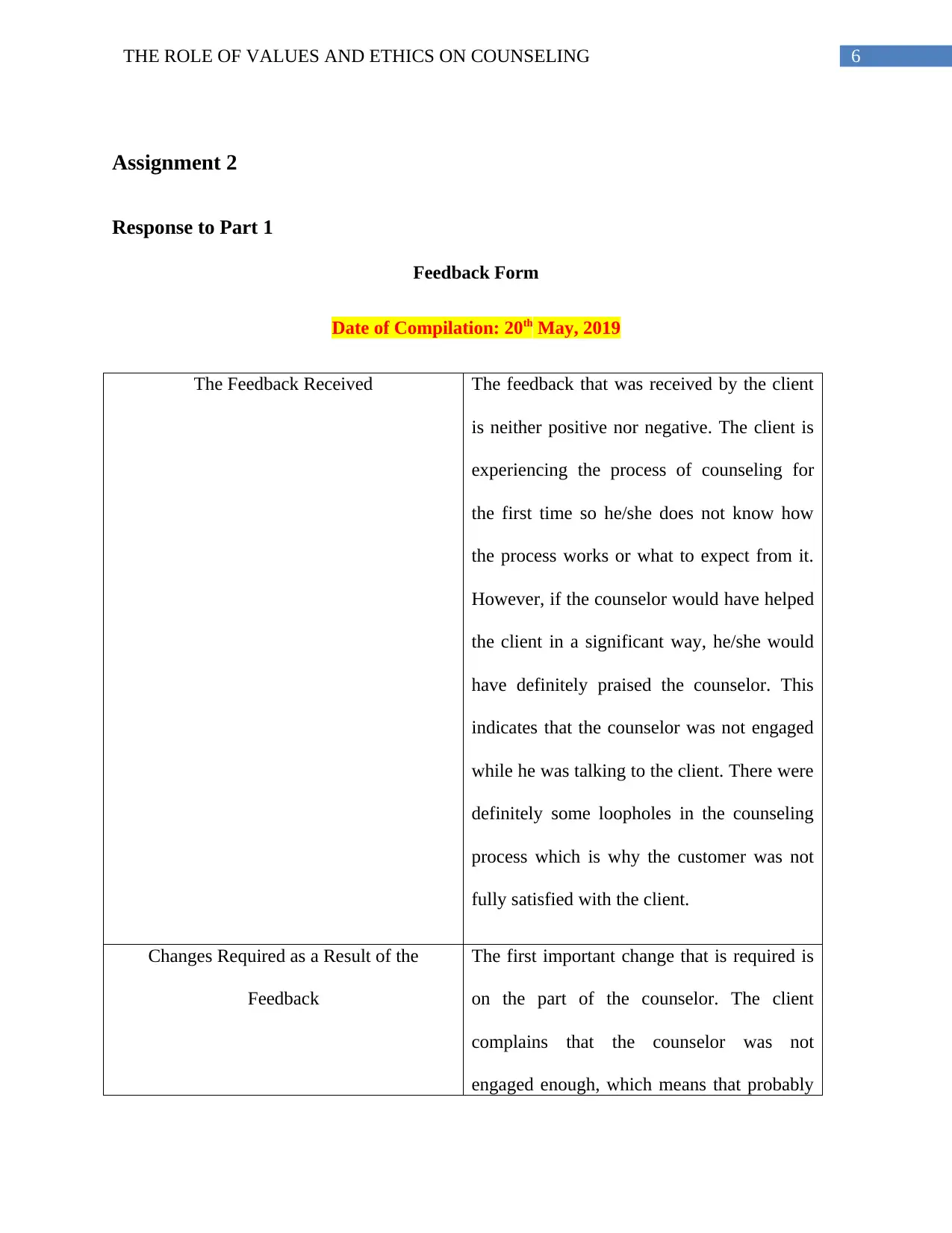
6THE ROLE OF VALUES AND ETHICS ON COUNSELING
Assignment 2
Response to Part 1
Feedback Form
Date of Compilation: 20th May, 2019
The Feedback Received The feedback that was received by the client
is neither positive nor negative. The client is
experiencing the process of counseling for
the first time so he/she does not know how
the process works or what to expect from it.
However, if the counselor would have helped
the client in a significant way, he/she would
have definitely praised the counselor. This
indicates that the counselor was not engaged
while he was talking to the client. There were
definitely some loopholes in the counseling
process which is why the customer was not
fully satisfied with the client.
Changes Required as a Result of the
Feedback
The first important change that is required is
on the part of the counselor. The client
complains that the counselor was not
engaged enough, which means that probably
Assignment 2
Response to Part 1
Feedback Form
Date of Compilation: 20th May, 2019
The Feedback Received The feedback that was received by the client
is neither positive nor negative. The client is
experiencing the process of counseling for
the first time so he/she does not know how
the process works or what to expect from it.
However, if the counselor would have helped
the client in a significant way, he/she would
have definitely praised the counselor. This
indicates that the counselor was not engaged
while he was talking to the client. There were
definitely some loopholes in the counseling
process which is why the customer was not
fully satisfied with the client.
Changes Required as a Result of the
Feedback
The first important change that is required is
on the part of the counselor. The client
complains that the counselor was not
engaged enough, which means that probably
Paraphrase This Document
Need a fresh take? Get an instant paraphrase of this document with our AI Paraphraser
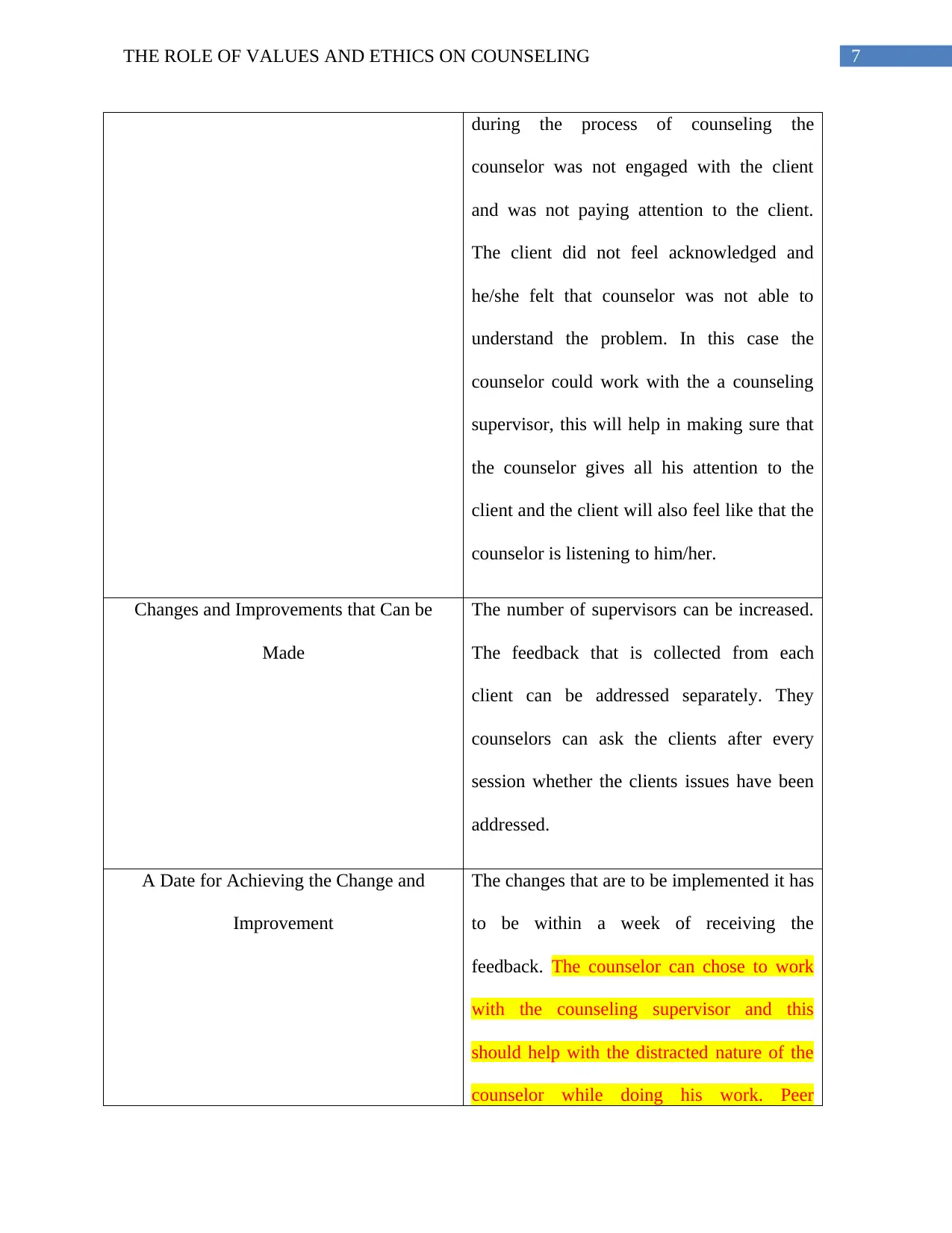
7THE ROLE OF VALUES AND ETHICS ON COUNSELING
during the process of counseling the
counselor was not engaged with the client
and was not paying attention to the client.
The client did not feel acknowledged and
he/she felt that counselor was not able to
understand the problem. In this case the
counselor could work with the a counseling
supervisor, this will help in making sure that
the counselor gives all his attention to the
client and the client will also feel like that the
counselor is listening to him/her.
Changes and Improvements that Can be
Made
The number of supervisors can be increased.
The feedback that is collected from each
client can be addressed separately. They
counselors can ask the clients after every
session whether the clients issues have been
addressed.
A Date for Achieving the Change and
Improvement
The changes that are to be implemented it has
to be within a week of receiving the
feedback. The counselor can chose to work
with the counseling supervisor and this
should help with the distracted nature of the
counselor while doing his work. Peer
during the process of counseling the
counselor was not engaged with the client
and was not paying attention to the client.
The client did not feel acknowledged and
he/she felt that counselor was not able to
understand the problem. In this case the
counselor could work with the a counseling
supervisor, this will help in making sure that
the counselor gives all his attention to the
client and the client will also feel like that the
counselor is listening to him/her.
Changes and Improvements that Can be
Made
The number of supervisors can be increased.
The feedback that is collected from each
client can be addressed separately. They
counselors can ask the clients after every
session whether the clients issues have been
addressed.
A Date for Achieving the Change and
Improvement
The changes that are to be implemented it has
to be within a week of receiving the
feedback. The counselor can chose to work
with the counseling supervisor and this
should help with the distracted nature of the
counselor while doing his work. Peer
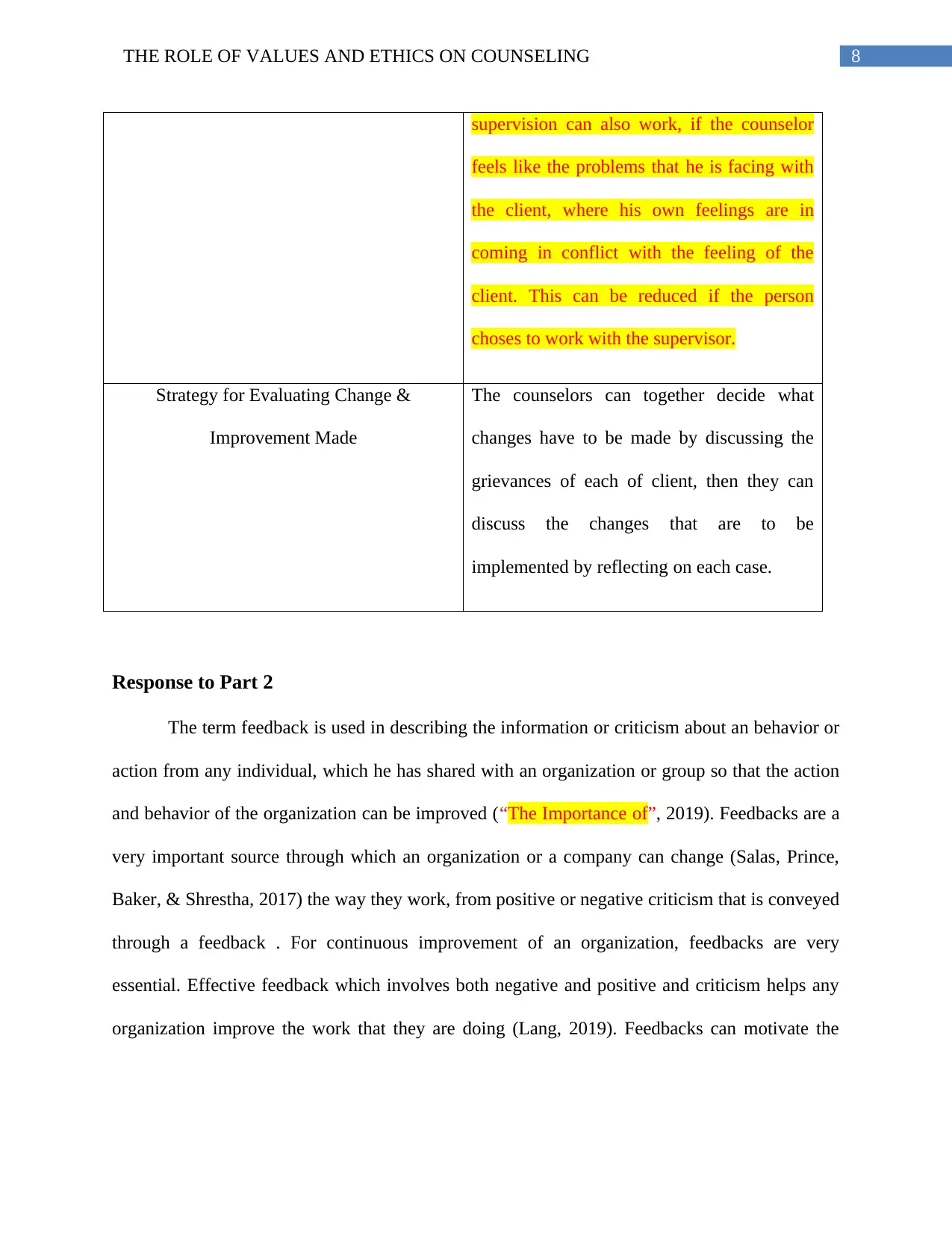
8THE ROLE OF VALUES AND ETHICS ON COUNSELING
supervision can also work, if the counselor
feels like the problems that he is facing with
the client, where his own feelings are in
coming in conflict with the feeling of the
client. This can be reduced if the person
choses to work with the supervisor.
Strategy for Evaluating Change &
Improvement Made
The counselors can together decide what
changes have to be made by discussing the
grievances of each of client, then they can
discuss the changes that are to be
implemented by reflecting on each case.
Response to Part 2
The term feedback is used in describing the information or criticism about an behavior or
action from any individual, which he has shared with an organization or group so that the action
and behavior of the organization can be improved (“The Importance of”, 2019). Feedbacks are a
very important source through which an organization or a company can change (Salas, Prince,
Baker, & Shrestha, 2017) the way they work, from positive or negative criticism that is conveyed
through a feedback . For continuous improvement of an organization, feedbacks are very
essential. Effective feedback which involves both negative and positive and criticism helps any
organization improve the work that they are doing (Lang, 2019). Feedbacks can motivate the
supervision can also work, if the counselor
feels like the problems that he is facing with
the client, where his own feelings are in
coming in conflict with the feeling of the
client. This can be reduced if the person
choses to work with the supervisor.
Strategy for Evaluating Change &
Improvement Made
The counselors can together decide what
changes have to be made by discussing the
grievances of each of client, then they can
discuss the changes that are to be
implemented by reflecting on each case.
Response to Part 2
The term feedback is used in describing the information or criticism about an behavior or
action from any individual, which he has shared with an organization or group so that the action
and behavior of the organization can be improved (“The Importance of”, 2019). Feedbacks are a
very important source through which an organization or a company can change (Salas, Prince,
Baker, & Shrestha, 2017) the way they work, from positive or negative criticism that is conveyed
through a feedback . For continuous improvement of an organization, feedbacks are very
essential. Effective feedback which involves both negative and positive and criticism helps any
organization improve the work that they are doing (Lang, 2019). Feedbacks can motivate the
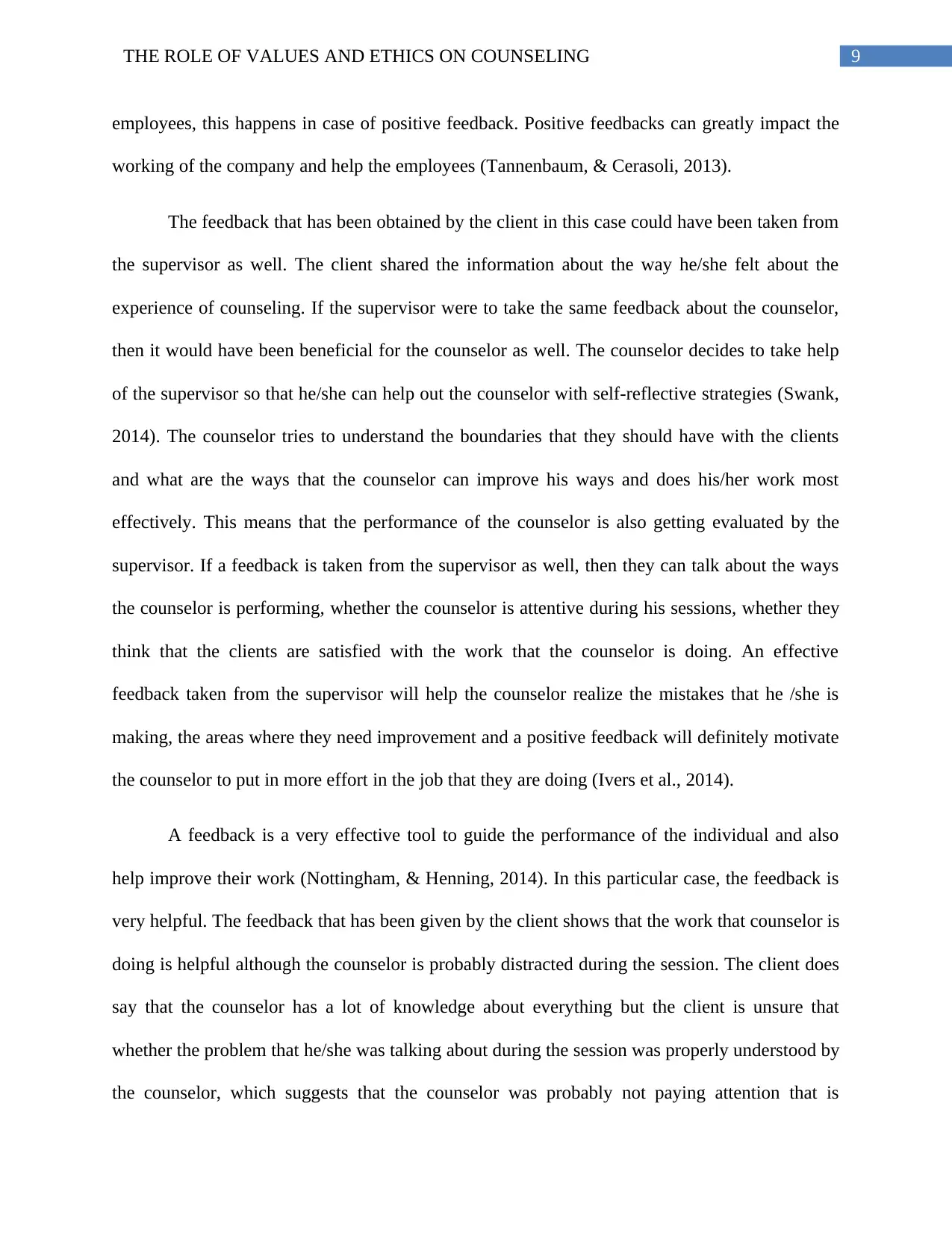
9THE ROLE OF VALUES AND ETHICS ON COUNSELING
employees, this happens in case of positive feedback. Positive feedbacks can greatly impact the
working of the company and help the employees (Tannenbaum, & Cerasoli, 2013).
The feedback that has been obtained by the client in this case could have been taken from
the supervisor as well. The client shared the information about the way he/she felt about the
experience of counseling. If the supervisor were to take the same feedback about the counselor,
then it would have been beneficial for the counselor as well. The counselor decides to take help
of the supervisor so that he/she can help out the counselor with self-reflective strategies (Swank,
2014). The counselor tries to understand the boundaries that they should have with the clients
and what are the ways that the counselor can improve his ways and does his/her work most
effectively. This means that the performance of the counselor is also getting evaluated by the
supervisor. If a feedback is taken from the supervisor as well, then they can talk about the ways
the counselor is performing, whether the counselor is attentive during his sessions, whether they
think that the clients are satisfied with the work that the counselor is doing. An effective
feedback taken from the supervisor will help the counselor realize the mistakes that he /she is
making, the areas where they need improvement and a positive feedback will definitely motivate
the counselor to put in more effort in the job that they are doing (Ivers et al., 2014).
A feedback is a very effective tool to guide the performance of the individual and also
help improve their work (Nottingham, & Henning, 2014). In this particular case, the feedback is
very helpful. The feedback that has been given by the client shows that the work that counselor is
doing is helpful although the counselor is probably distracted during the session. The client does
say that the counselor has a lot of knowledge about everything but the client is unsure that
whether the problem that he/she was talking about during the session was properly understood by
the counselor, which suggests that the counselor was probably not paying attention that is
employees, this happens in case of positive feedback. Positive feedbacks can greatly impact the
working of the company and help the employees (Tannenbaum, & Cerasoli, 2013).
The feedback that has been obtained by the client in this case could have been taken from
the supervisor as well. The client shared the information about the way he/she felt about the
experience of counseling. If the supervisor were to take the same feedback about the counselor,
then it would have been beneficial for the counselor as well. The counselor decides to take help
of the supervisor so that he/she can help out the counselor with self-reflective strategies (Swank,
2014). The counselor tries to understand the boundaries that they should have with the clients
and what are the ways that the counselor can improve his ways and does his/her work most
effectively. This means that the performance of the counselor is also getting evaluated by the
supervisor. If a feedback is taken from the supervisor as well, then they can talk about the ways
the counselor is performing, whether the counselor is attentive during his sessions, whether they
think that the clients are satisfied with the work that the counselor is doing. An effective
feedback taken from the supervisor will help the counselor realize the mistakes that he /she is
making, the areas where they need improvement and a positive feedback will definitely motivate
the counselor to put in more effort in the job that they are doing (Ivers et al., 2014).
A feedback is a very effective tool to guide the performance of the individual and also
help improve their work (Nottingham, & Henning, 2014). In this particular case, the feedback is
very helpful. The feedback that has been given by the client shows that the work that counselor is
doing is helpful although the counselor is probably distracted during the session. The client does
say that the counselor has a lot of knowledge about everything but the client is unsure that
whether the problem that he/she was talking about during the session was properly understood by
the counselor, which suggests that the counselor was probably not paying attention that is
Secure Best Marks with AI Grader
Need help grading? Try our AI Grader for instant feedback on your assignments.
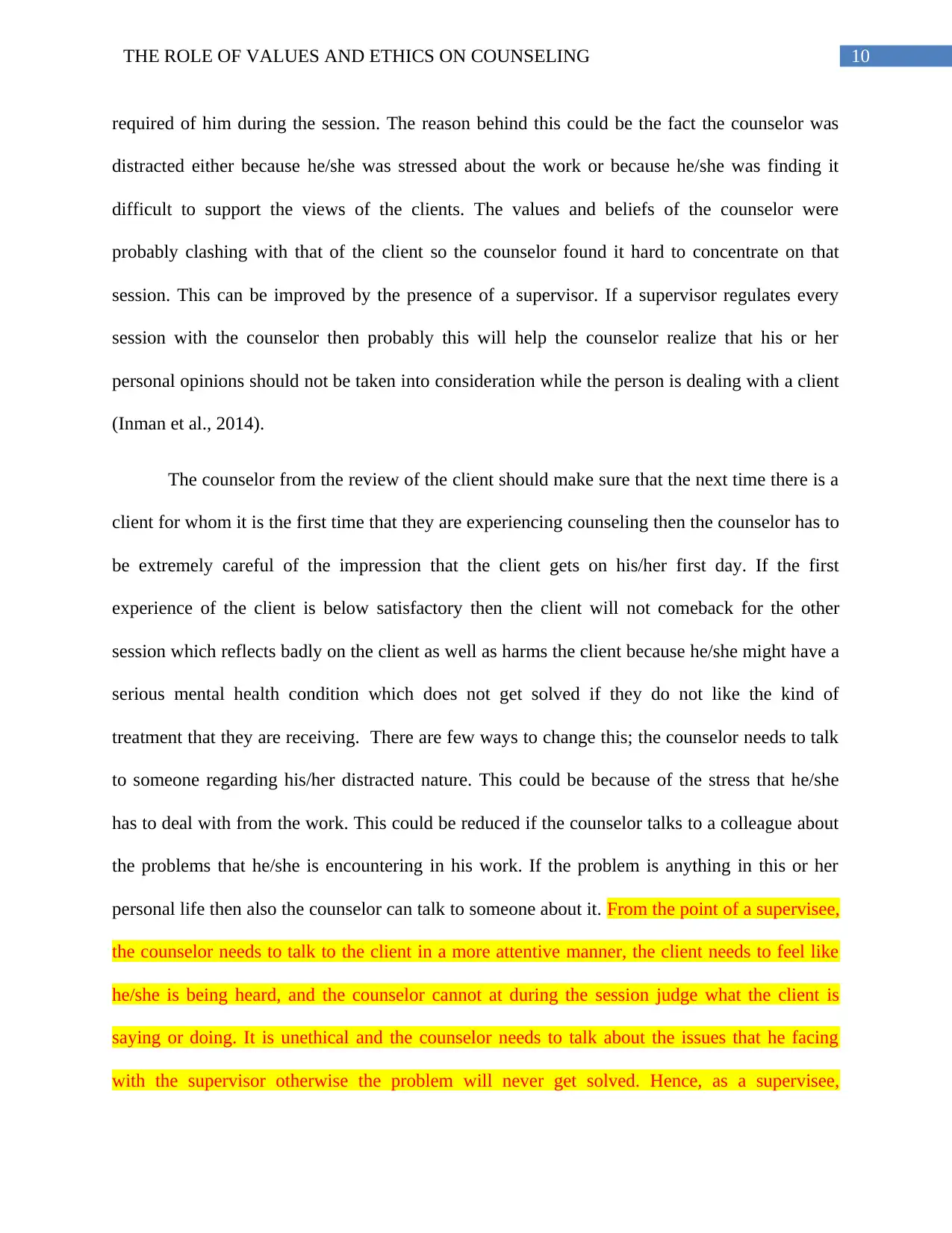
10THE ROLE OF VALUES AND ETHICS ON COUNSELING
required of him during the session. The reason behind this could be the fact the counselor was
distracted either because he/she was stressed about the work or because he/she was finding it
difficult to support the views of the clients. The values and beliefs of the counselor were
probably clashing with that of the client so the counselor found it hard to concentrate on that
session. This can be improved by the presence of a supervisor. If a supervisor regulates every
session with the counselor then probably this will help the counselor realize that his or her
personal opinions should not be taken into consideration while the person is dealing with a client
(Inman et al., 2014).
The counselor from the review of the client should make sure that the next time there is a
client for whom it is the first time that they are experiencing counseling then the counselor has to
be extremely careful of the impression that the client gets on his/her first day. If the first
experience of the client is below satisfactory then the client will not comeback for the other
session which reflects badly on the client as well as harms the client because he/she might have a
serious mental health condition which does not get solved if they do not like the kind of
treatment that they are receiving. There are few ways to change this; the counselor needs to talk
to someone regarding his/her distracted nature. This could be because of the stress that he/she
has to deal with from the work. This could be reduced if the counselor talks to a colleague about
the problems that he/she is encountering in his work. If the problem is anything in this or her
personal life then also the counselor can talk to someone about it. From the point of a supervisee,
the counselor needs to talk to the client in a more attentive manner, the client needs to feel like
he/she is being heard, and the counselor cannot at during the session judge what the client is
saying or doing. It is unethical and the counselor needs to talk about the issues that he facing
with the supervisor otherwise the problem will never get solved. Hence, as a supervisee,
required of him during the session. The reason behind this could be the fact the counselor was
distracted either because he/she was stressed about the work or because he/she was finding it
difficult to support the views of the clients. The values and beliefs of the counselor were
probably clashing with that of the client so the counselor found it hard to concentrate on that
session. This can be improved by the presence of a supervisor. If a supervisor regulates every
session with the counselor then probably this will help the counselor realize that his or her
personal opinions should not be taken into consideration while the person is dealing with a client
(Inman et al., 2014).
The counselor from the review of the client should make sure that the next time there is a
client for whom it is the first time that they are experiencing counseling then the counselor has to
be extremely careful of the impression that the client gets on his/her first day. If the first
experience of the client is below satisfactory then the client will not comeback for the other
session which reflects badly on the client as well as harms the client because he/she might have a
serious mental health condition which does not get solved if they do not like the kind of
treatment that they are receiving. There are few ways to change this; the counselor needs to talk
to someone regarding his/her distracted nature. This could be because of the stress that he/she
has to deal with from the work. This could be reduced if the counselor talks to a colleague about
the problems that he/she is encountering in his work. If the problem is anything in this or her
personal life then also the counselor can talk to someone about it. From the point of a supervisee,
the counselor needs to talk to the client in a more attentive manner, the client needs to feel like
he/she is being heard, and the counselor cannot at during the session judge what the client is
saying or doing. It is unethical and the counselor needs to talk about the issues that he facing
with the supervisor otherwise the problem will never get solved. Hence, as a supervisee,
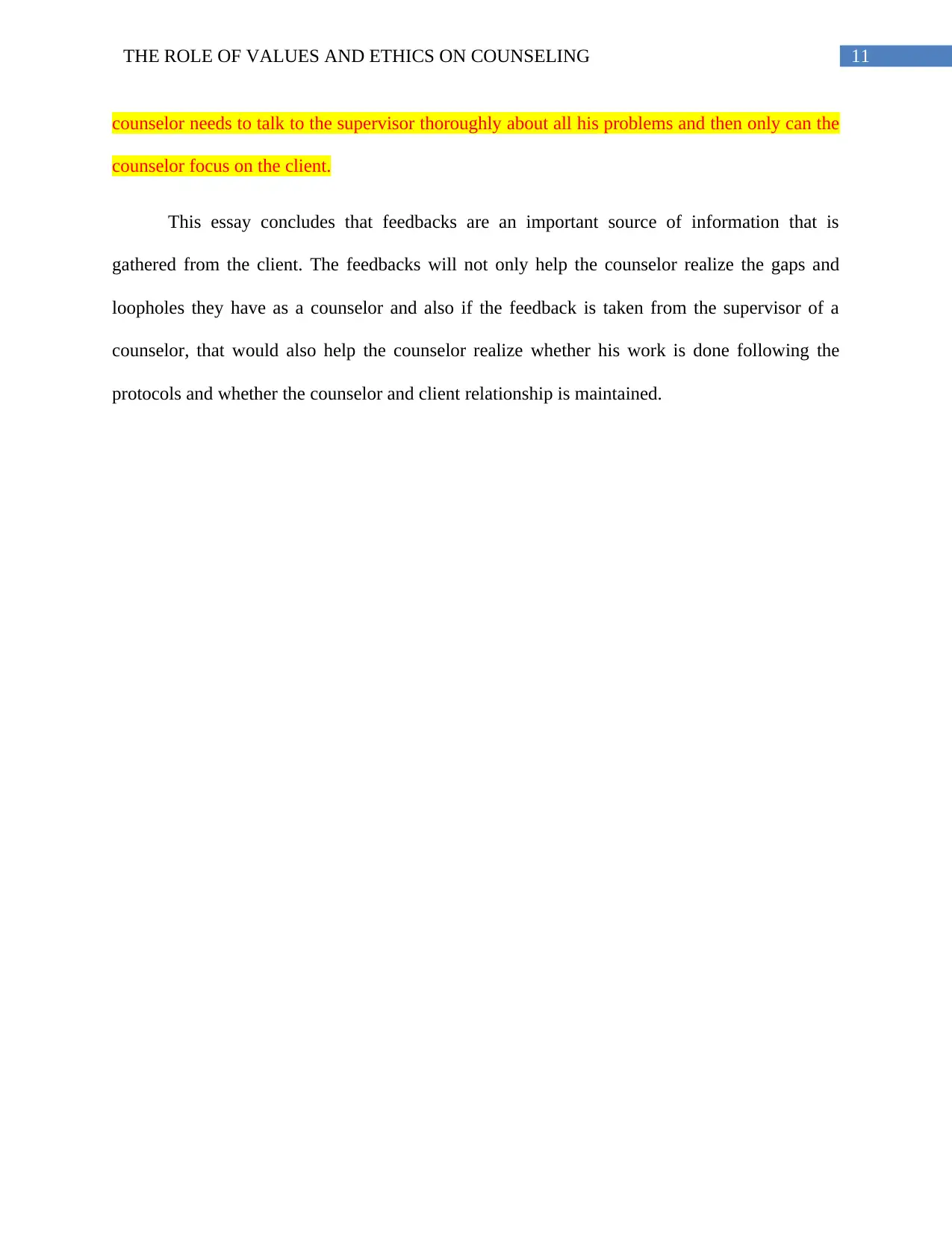
11THE ROLE OF VALUES AND ETHICS ON COUNSELING
counselor needs to talk to the supervisor thoroughly about all his problems and then only can the
counselor focus on the client.
This essay concludes that feedbacks are an important source of information that is
gathered from the client. The feedbacks will not only help the counselor realize the gaps and
loopholes they have as a counselor and also if the feedback is taken from the supervisor of a
counselor, that would also help the counselor realize whether his work is done following the
protocols and whether the counselor and client relationship is maintained.
counselor needs to talk to the supervisor thoroughly about all his problems and then only can the
counselor focus on the client.
This essay concludes that feedbacks are an important source of information that is
gathered from the client. The feedbacks will not only help the counselor realize the gaps and
loopholes they have as a counselor and also if the feedback is taken from the supervisor of a
counselor, that would also help the counselor realize whether his work is done following the
protocols and whether the counselor and client relationship is maintained.
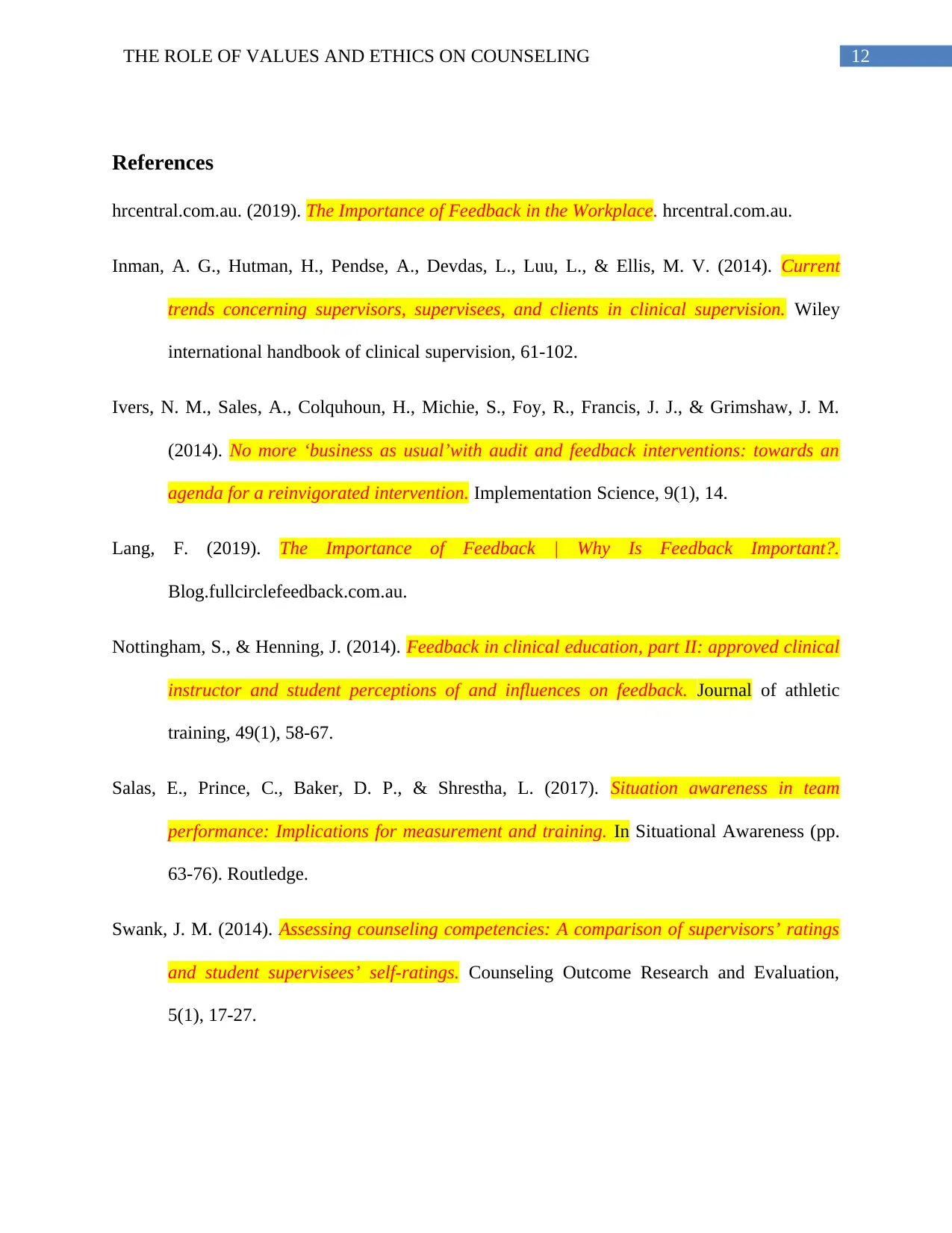
12THE ROLE OF VALUES AND ETHICS ON COUNSELING
References
hrcentral.com.au. (2019). The Importance of Feedback in the Workplace. hrcentral.com.au.
Inman, A. G., Hutman, H., Pendse, A., Devdas, L., Luu, L., & Ellis, M. V. (2014). Current
trends concerning supervisors, supervisees, and clients in clinical supervision. Wiley
international handbook of clinical supervision, 61-102.
Ivers, N. M., Sales, A., Colquhoun, H., Michie, S., Foy, R., Francis, J. J., & Grimshaw, J. M.
(2014). No more ‘business as usual’with audit and feedback interventions: towards an
agenda for a reinvigorated intervention. Implementation Science, 9(1), 14.
Lang, F. (2019). The Importance of Feedback | Why Is Feedback Important?.
Blog.fullcirclefeedback.com.au.
Nottingham, S., & Henning, J. (2014). Feedback in clinical education, part II: approved clinical
instructor and student perceptions of and influences on feedback. Journal of athletic
training, 49(1), 58-67.
Salas, E., Prince, C., Baker, D. P., & Shrestha, L. (2017). Situation awareness in team
performance: Implications for measurement and training. In Situational Awareness (pp.
63-76). Routledge.
Swank, J. M. (2014). Assessing counseling competencies: A comparison of supervisors’ ratings
and student supervisees’ self-ratings. Counseling Outcome Research and Evaluation,
5(1), 17-27.
References
hrcentral.com.au. (2019). The Importance of Feedback in the Workplace. hrcentral.com.au.
Inman, A. G., Hutman, H., Pendse, A., Devdas, L., Luu, L., & Ellis, M. V. (2014). Current
trends concerning supervisors, supervisees, and clients in clinical supervision. Wiley
international handbook of clinical supervision, 61-102.
Ivers, N. M., Sales, A., Colquhoun, H., Michie, S., Foy, R., Francis, J. J., & Grimshaw, J. M.
(2014). No more ‘business as usual’with audit and feedback interventions: towards an
agenda for a reinvigorated intervention. Implementation Science, 9(1), 14.
Lang, F. (2019). The Importance of Feedback | Why Is Feedback Important?.
Blog.fullcirclefeedback.com.au.
Nottingham, S., & Henning, J. (2014). Feedback in clinical education, part II: approved clinical
instructor and student perceptions of and influences on feedback. Journal of athletic
training, 49(1), 58-67.
Salas, E., Prince, C., Baker, D. P., & Shrestha, L. (2017). Situation awareness in team
performance: Implications for measurement and training. In Situational Awareness (pp.
63-76). Routledge.
Swank, J. M. (2014). Assessing counseling competencies: A comparison of supervisors’ ratings
and student supervisees’ self-ratings. Counseling Outcome Research and Evaluation,
5(1), 17-27.
Paraphrase This Document
Need a fresh take? Get an instant paraphrase of this document with our AI Paraphraser
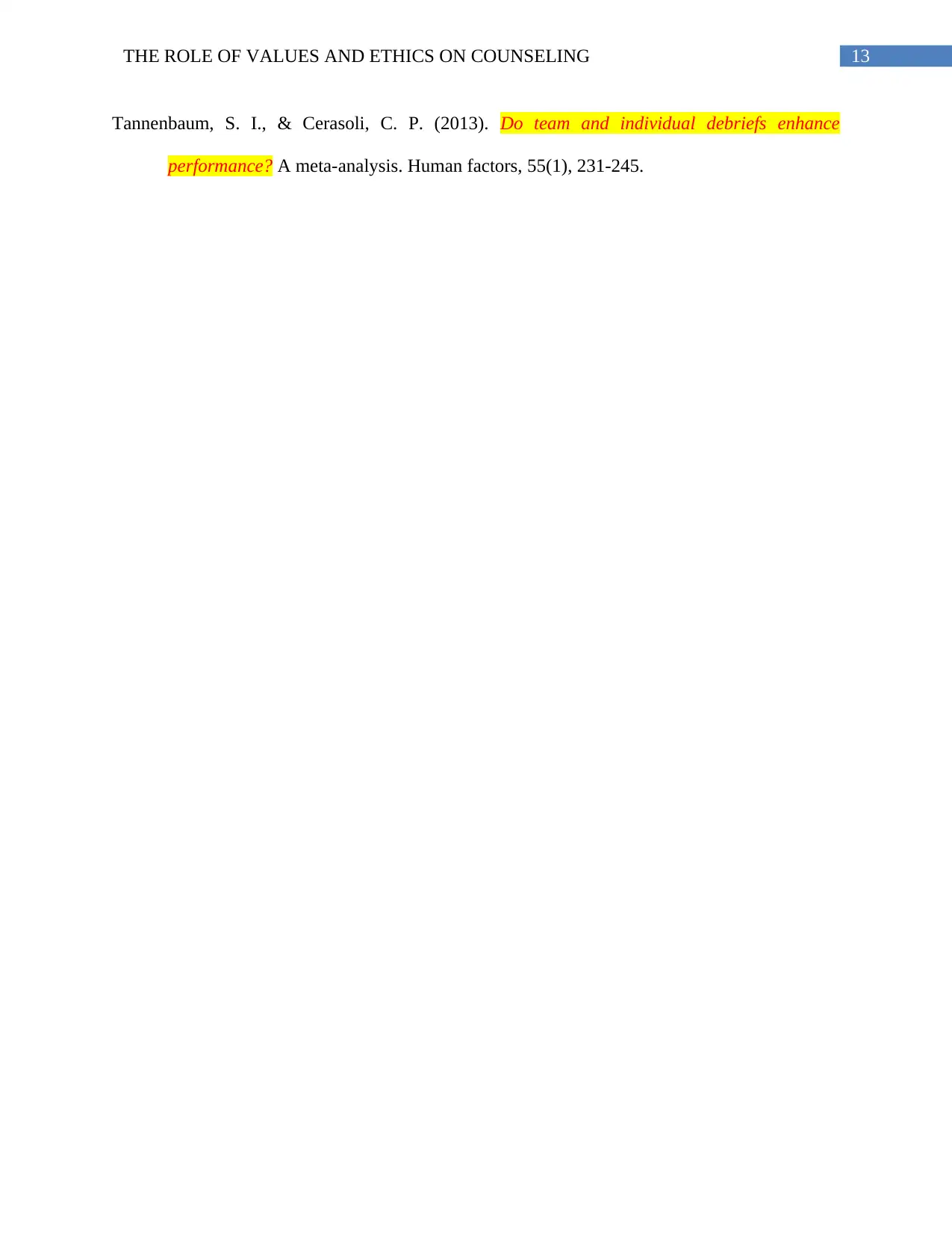
13THE ROLE OF VALUES AND ETHICS ON COUNSELING
Tannenbaum, S. I., & Cerasoli, C. P. (2013). Do team and individual debriefs enhance
performance? A meta-analysis. Human factors, 55(1), 231-245.
Tannenbaum, S. I., & Cerasoli, C. P. (2013). Do team and individual debriefs enhance
performance? A meta-analysis. Human factors, 55(1), 231-245.
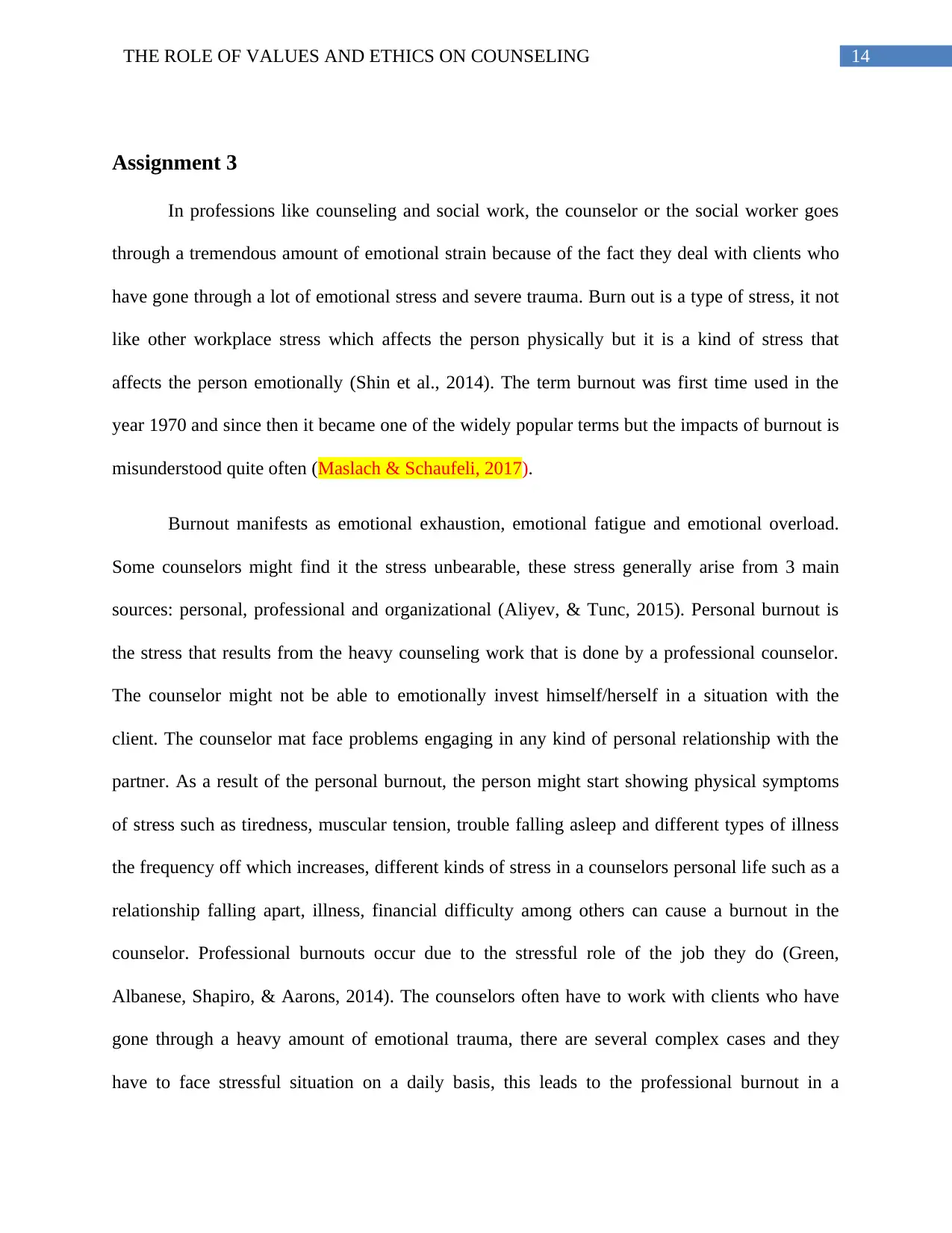
14THE ROLE OF VALUES AND ETHICS ON COUNSELING
Assignment 3
In professions like counseling and social work, the counselor or the social worker goes
through a tremendous amount of emotional strain because of the fact they deal with clients who
have gone through a lot of emotional stress and severe trauma. Burn out is a type of stress, it not
like other workplace stress which affects the person physically but it is a kind of stress that
affects the person emotionally (Shin et al., 2014). The term burnout was first time used in the
year 1970 and since then it became one of the widely popular terms but the impacts of burnout is
misunderstood quite often (Maslach & Schaufeli, 2017).
Burnout manifests as emotional exhaustion, emotional fatigue and emotional overload.
Some counselors might find it the stress unbearable, these stress generally arise from 3 main
sources: personal, professional and organizational (Aliyev, & Tunc, 2015). Personal burnout is
the stress that results from the heavy counseling work that is done by a professional counselor.
The counselor might not be able to emotionally invest himself/herself in a situation with the
client. The counselor mat face problems engaging in any kind of personal relationship with the
partner. As a result of the personal burnout, the person might start showing physical symptoms
of stress such as tiredness, muscular tension, trouble falling asleep and different types of illness
the frequency off which increases, different kinds of stress in a counselors personal life such as a
relationship falling apart, illness, financial difficulty among others can cause a burnout in the
counselor. Professional burnouts occur due to the stressful role of the job they do (Green,
Albanese, Shapiro, & Aarons, 2014). The counselors often have to work with clients who have
gone through a heavy amount of emotional trauma, there are several complex cases and they
have to face stressful situation on a daily basis, this leads to the professional burnout in a
Assignment 3
In professions like counseling and social work, the counselor or the social worker goes
through a tremendous amount of emotional strain because of the fact they deal with clients who
have gone through a lot of emotional stress and severe trauma. Burn out is a type of stress, it not
like other workplace stress which affects the person physically but it is a kind of stress that
affects the person emotionally (Shin et al., 2014). The term burnout was first time used in the
year 1970 and since then it became one of the widely popular terms but the impacts of burnout is
misunderstood quite often (Maslach & Schaufeli, 2017).
Burnout manifests as emotional exhaustion, emotional fatigue and emotional overload.
Some counselors might find it the stress unbearable, these stress generally arise from 3 main
sources: personal, professional and organizational (Aliyev, & Tunc, 2015). Personal burnout is
the stress that results from the heavy counseling work that is done by a professional counselor.
The counselor might not be able to emotionally invest himself/herself in a situation with the
client. The counselor mat face problems engaging in any kind of personal relationship with the
partner. As a result of the personal burnout, the person might start showing physical symptoms
of stress such as tiredness, muscular tension, trouble falling asleep and different types of illness
the frequency off which increases, different kinds of stress in a counselors personal life such as a
relationship falling apart, illness, financial difficulty among others can cause a burnout in the
counselor. Professional burnouts occur due to the stressful role of the job they do (Green,
Albanese, Shapiro, & Aarons, 2014). The counselors often have to work with clients who have
gone through a heavy amount of emotional trauma, there are several complex cases and they
have to face stressful situation on a daily basis, this leads to the professional burnout in a
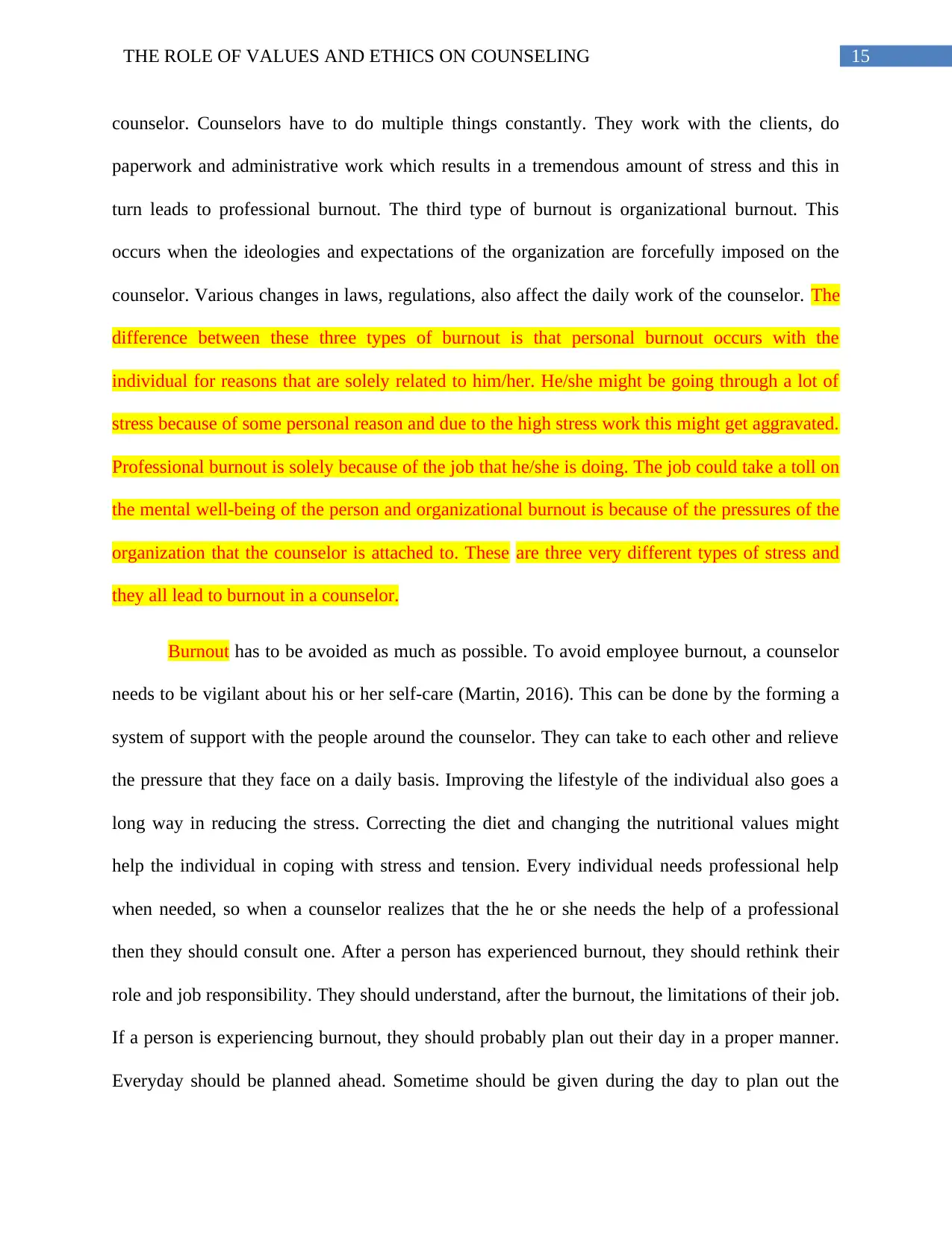
15THE ROLE OF VALUES AND ETHICS ON COUNSELING
counselor. Counselors have to do multiple things constantly. They work with the clients, do
paperwork and administrative work which results in a tremendous amount of stress and this in
turn leads to professional burnout. The third type of burnout is organizational burnout. This
occurs when the ideologies and expectations of the organization are forcefully imposed on the
counselor. Various changes in laws, regulations, also affect the daily work of the counselor. The
difference between these three types of burnout is that personal burnout occurs with the
individual for reasons that are solely related to him/her. He/she might be going through a lot of
stress because of some personal reason and due to the high stress work this might get aggravated.
Professional burnout is solely because of the job that he/she is doing. The job could take a toll on
the mental well-being of the person and organizational burnout is because of the pressures of the
organization that the counselor is attached to. These are three very different types of stress and
they all lead to burnout in a counselor.
Burnout has to be avoided as much as possible. To avoid employee burnout, a counselor
needs to be vigilant about his or her self-care (Martin, 2016). This can be done by the forming a
system of support with the people around the counselor. They can take to each other and relieve
the pressure that they face on a daily basis. Improving the lifestyle of the individual also goes a
long way in reducing the stress. Correcting the diet and changing the nutritional values might
help the individual in coping with stress and tension. Every individual needs professional help
when needed, so when a counselor realizes that the he or she needs the help of a professional
then they should consult one. After a person has experienced burnout, they should rethink their
role and job responsibility. They should understand, after the burnout, the limitations of their job.
If a person is experiencing burnout, they should probably plan out their day in a proper manner.
Everyday should be planned ahead. Sometime should be given during the day to plan out the
counselor. Counselors have to do multiple things constantly. They work with the clients, do
paperwork and administrative work which results in a tremendous amount of stress and this in
turn leads to professional burnout. The third type of burnout is organizational burnout. This
occurs when the ideologies and expectations of the organization are forcefully imposed on the
counselor. Various changes in laws, regulations, also affect the daily work of the counselor. The
difference between these three types of burnout is that personal burnout occurs with the
individual for reasons that are solely related to him/her. He/she might be going through a lot of
stress because of some personal reason and due to the high stress work this might get aggravated.
Professional burnout is solely because of the job that he/she is doing. The job could take a toll on
the mental well-being of the person and organizational burnout is because of the pressures of the
organization that the counselor is attached to. These are three very different types of stress and
they all lead to burnout in a counselor.
Burnout has to be avoided as much as possible. To avoid employee burnout, a counselor
needs to be vigilant about his or her self-care (Martin, 2016). This can be done by the forming a
system of support with the people around the counselor. They can take to each other and relieve
the pressure that they face on a daily basis. Improving the lifestyle of the individual also goes a
long way in reducing the stress. Correcting the diet and changing the nutritional values might
help the individual in coping with stress and tension. Every individual needs professional help
when needed, so when a counselor realizes that the he or she needs the help of a professional
then they should consult one. After a person has experienced burnout, they should rethink their
role and job responsibility. They should understand, after the burnout, the limitations of their job.
If a person is experiencing burnout, they should probably plan out their day in a proper manner.
Everyday should be planned ahead. Sometime should be given during the day to plan out the
Secure Best Marks with AI Grader
Need help grading? Try our AI Grader for instant feedback on your assignments.
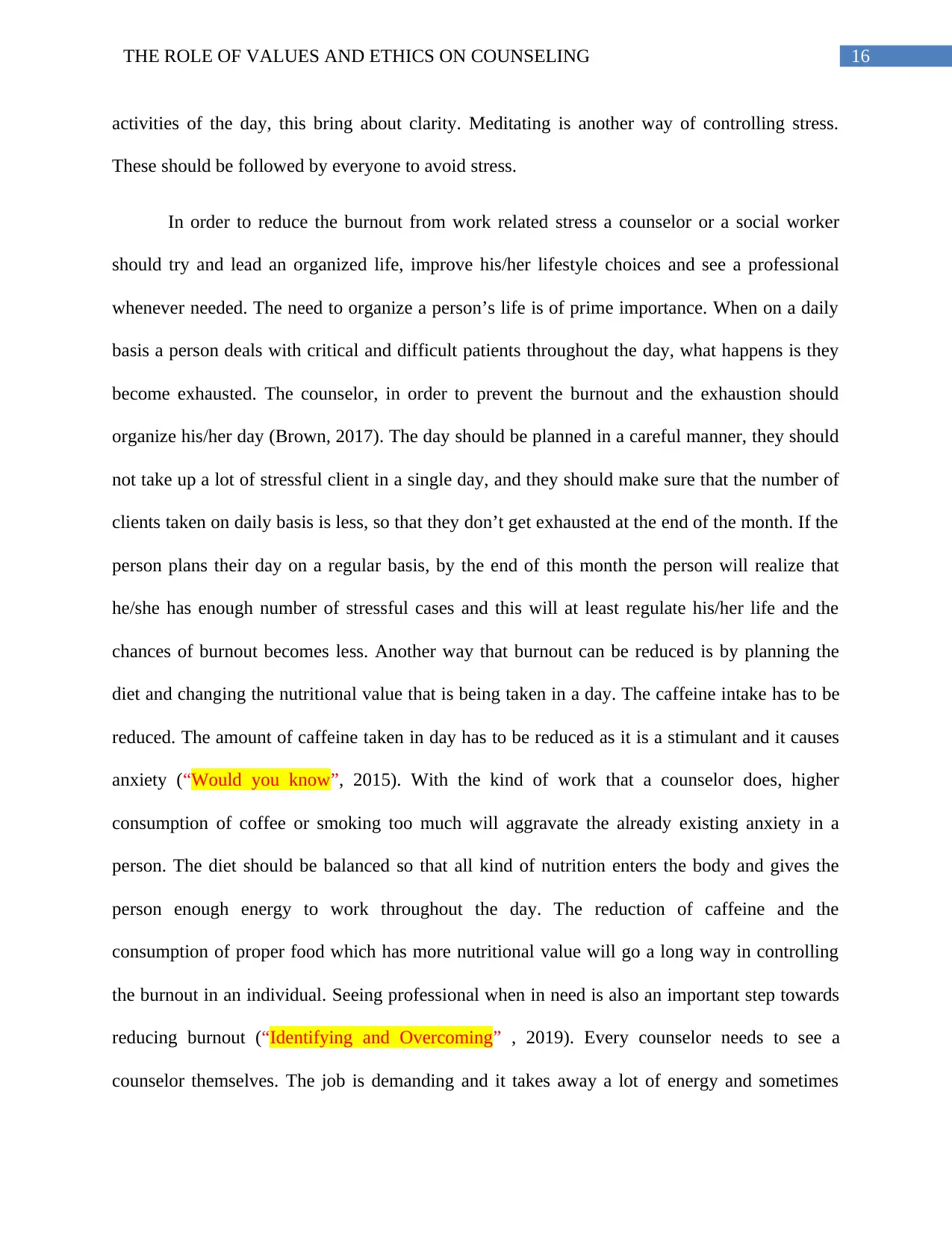
16THE ROLE OF VALUES AND ETHICS ON COUNSELING
activities of the day, this bring about clarity. Meditating is another way of controlling stress.
These should be followed by everyone to avoid stress.
In order to reduce the burnout from work related stress a counselor or a social worker
should try and lead an organized life, improve his/her lifestyle choices and see a professional
whenever needed. The need to organize a person’s life is of prime importance. When on a daily
basis a person deals with critical and difficult patients throughout the day, what happens is they
become exhausted. The counselor, in order to prevent the burnout and the exhaustion should
organize his/her day (Brown, 2017). The day should be planned in a careful manner, they should
not take up a lot of stressful client in a single day, and they should make sure that the number of
clients taken on daily basis is less, so that they don’t get exhausted at the end of the month. If the
person plans their day on a regular basis, by the end of this month the person will realize that
he/she has enough number of stressful cases and this will at least regulate his/her life and the
chances of burnout becomes less. Another way that burnout can be reduced is by planning the
diet and changing the nutritional value that is being taken in a day. The caffeine intake has to be
reduced. The amount of caffeine taken in day has to be reduced as it is a stimulant and it causes
anxiety (“Would you know”, 2015). With the kind of work that a counselor does, higher
consumption of coffee or smoking too much will aggravate the already existing anxiety in a
person. The diet should be balanced so that all kind of nutrition enters the body and gives the
person enough energy to work throughout the day. The reduction of caffeine and the
consumption of proper food which has more nutritional value will go a long way in controlling
the burnout in an individual. Seeing professional when in need is also an important step towards
reducing burnout (“Identifying and Overcoming” , 2019). Every counselor needs to see a
counselor themselves. The job is demanding and it takes away a lot of energy and sometimes
activities of the day, this bring about clarity. Meditating is another way of controlling stress.
These should be followed by everyone to avoid stress.
In order to reduce the burnout from work related stress a counselor or a social worker
should try and lead an organized life, improve his/her lifestyle choices and see a professional
whenever needed. The need to organize a person’s life is of prime importance. When on a daily
basis a person deals with critical and difficult patients throughout the day, what happens is they
become exhausted. The counselor, in order to prevent the burnout and the exhaustion should
organize his/her day (Brown, 2017). The day should be planned in a careful manner, they should
not take up a lot of stressful client in a single day, and they should make sure that the number of
clients taken on daily basis is less, so that they don’t get exhausted at the end of the month. If the
person plans their day on a regular basis, by the end of this month the person will realize that
he/she has enough number of stressful cases and this will at least regulate his/her life and the
chances of burnout becomes less. Another way that burnout can be reduced is by planning the
diet and changing the nutritional value that is being taken in a day. The caffeine intake has to be
reduced. The amount of caffeine taken in day has to be reduced as it is a stimulant and it causes
anxiety (“Would you know”, 2015). With the kind of work that a counselor does, higher
consumption of coffee or smoking too much will aggravate the already existing anxiety in a
person. The diet should be balanced so that all kind of nutrition enters the body and gives the
person enough energy to work throughout the day. The reduction of caffeine and the
consumption of proper food which has more nutritional value will go a long way in controlling
the burnout in an individual. Seeing professional when in need is also an important step towards
reducing burnout (“Identifying and Overcoming” , 2019). Every counselor needs to see a
counselor themselves. The job is demanding and it takes away a lot of energy and sometimes
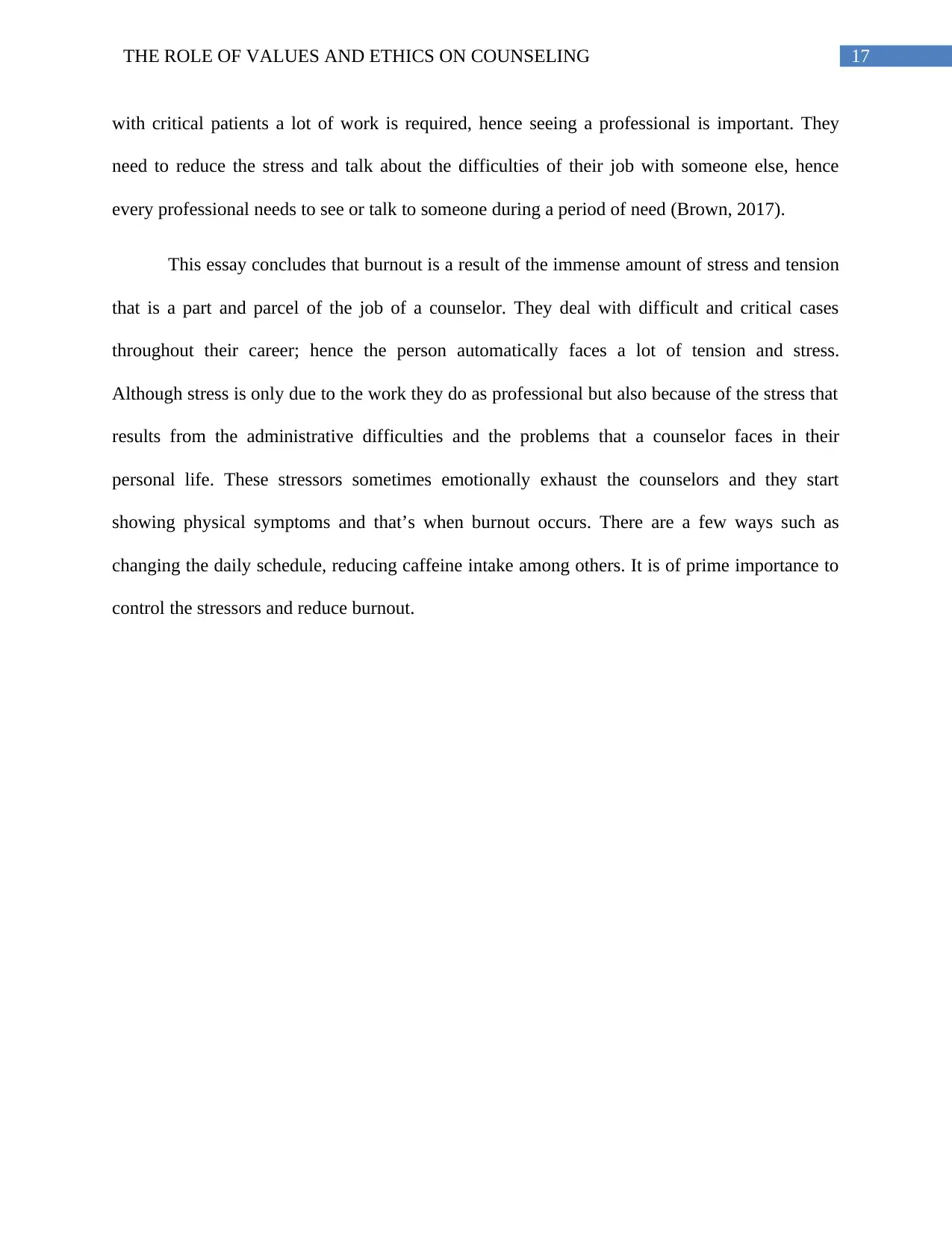
17THE ROLE OF VALUES AND ETHICS ON COUNSELING
with critical patients a lot of work is required, hence seeing a professional is important. They
need to reduce the stress and talk about the difficulties of their job with someone else, hence
every professional needs to see or talk to someone during a period of need (Brown, 2017).
This essay concludes that burnout is a result of the immense amount of stress and tension
that is a part and parcel of the job of a counselor. They deal with difficult and critical cases
throughout their career; hence the person automatically faces a lot of tension and stress.
Although stress is only due to the work they do as professional but also because of the stress that
results from the administrative difficulties and the problems that a counselor faces in their
personal life. These stressors sometimes emotionally exhaust the counselors and they start
showing physical symptoms and that’s when burnout occurs. There are a few ways such as
changing the daily schedule, reducing caffeine intake among others. It is of prime importance to
control the stressors and reduce burnout.
with critical patients a lot of work is required, hence seeing a professional is important. They
need to reduce the stress and talk about the difficulties of their job with someone else, hence
every professional needs to see or talk to someone during a period of need (Brown, 2017).
This essay concludes that burnout is a result of the immense amount of stress and tension
that is a part and parcel of the job of a counselor. They deal with difficult and critical cases
throughout their career; hence the person automatically faces a lot of tension and stress.
Although stress is only due to the work they do as professional but also because of the stress that
results from the administrative difficulties and the problems that a counselor faces in their
personal life. These stressors sometimes emotionally exhaust the counselors and they start
showing physical symptoms and that’s when burnout occurs. There are a few ways such as
changing the daily schedule, reducing caffeine intake among others. It is of prime importance to
control the stressors and reduce burnout.
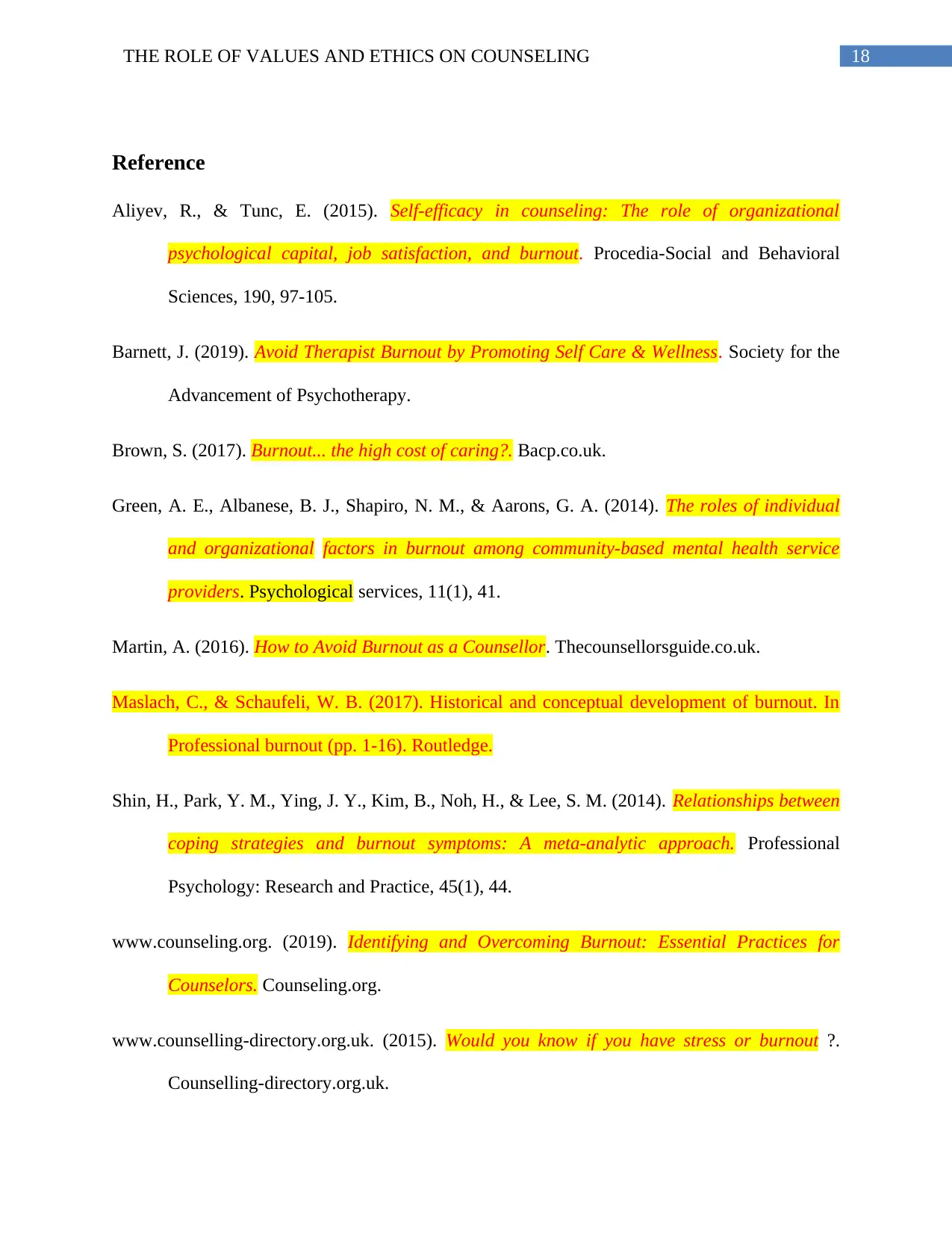
18THE ROLE OF VALUES AND ETHICS ON COUNSELING
Reference
Aliyev, R., & Tunc, E. (2015). Self-efficacy in counseling: The role of organizational
psychological capital, job satisfaction, and burnout. Procedia-Social and Behavioral
Sciences, 190, 97-105.
Barnett, J. (2019). Avoid Therapist Burnout by Promoting Self Care & Wellness. Society for the
Advancement of Psychotherapy.
Brown, S. (2017). Burnout... the high cost of caring?. Bacp.co.uk.
Green, A. E., Albanese, B. J., Shapiro, N. M., & Aarons, G. A. (2014). The roles of individual
and organizational factors in burnout among community-based mental health service
providers. Psychological services, 11(1), 41.
Martin, A. (2016). How to Avoid Burnout as a Counsellor. Thecounsellorsguide.co.uk.
Maslach, C., & Schaufeli, W. B. (2017). Historical and conceptual development of burnout. In
Professional burnout (pp. 1-16). Routledge.
Shin, H., Park, Y. M., Ying, J. Y., Kim, B., Noh, H., & Lee, S. M. (2014). Relationships between
coping strategies and burnout symptoms: A meta-analytic approach. Professional
Psychology: Research and Practice, 45(1), 44.
www.counseling.org. (2019). Identifying and Overcoming Burnout: Essential Practices for
Counselors. Counseling.org.
www.counselling-directory.org.uk. (2015). Would you know if you have stress or burnout ?.
Counselling-directory.org.uk.
Reference
Aliyev, R., & Tunc, E. (2015). Self-efficacy in counseling: The role of organizational
psychological capital, job satisfaction, and burnout. Procedia-Social and Behavioral
Sciences, 190, 97-105.
Barnett, J. (2019). Avoid Therapist Burnout by Promoting Self Care & Wellness. Society for the
Advancement of Psychotherapy.
Brown, S. (2017). Burnout... the high cost of caring?. Bacp.co.uk.
Green, A. E., Albanese, B. J., Shapiro, N. M., & Aarons, G. A. (2014). The roles of individual
and organizational factors in burnout among community-based mental health service
providers. Psychological services, 11(1), 41.
Martin, A. (2016). How to Avoid Burnout as a Counsellor. Thecounsellorsguide.co.uk.
Maslach, C., & Schaufeli, W. B. (2017). Historical and conceptual development of burnout. In
Professional burnout (pp. 1-16). Routledge.
Shin, H., Park, Y. M., Ying, J. Y., Kim, B., Noh, H., & Lee, S. M. (2014). Relationships between
coping strategies and burnout symptoms: A meta-analytic approach. Professional
Psychology: Research and Practice, 45(1), 44.
www.counseling.org. (2019). Identifying and Overcoming Burnout: Essential Practices for
Counselors. Counseling.org.
www.counselling-directory.org.uk. (2015). Would you know if you have stress or burnout ?.
Counselling-directory.org.uk.
Paraphrase This Document
Need a fresh take? Get an instant paraphrase of this document with our AI Paraphraser

19THE ROLE OF VALUES AND ETHICS ON COUNSELING
1.
1.
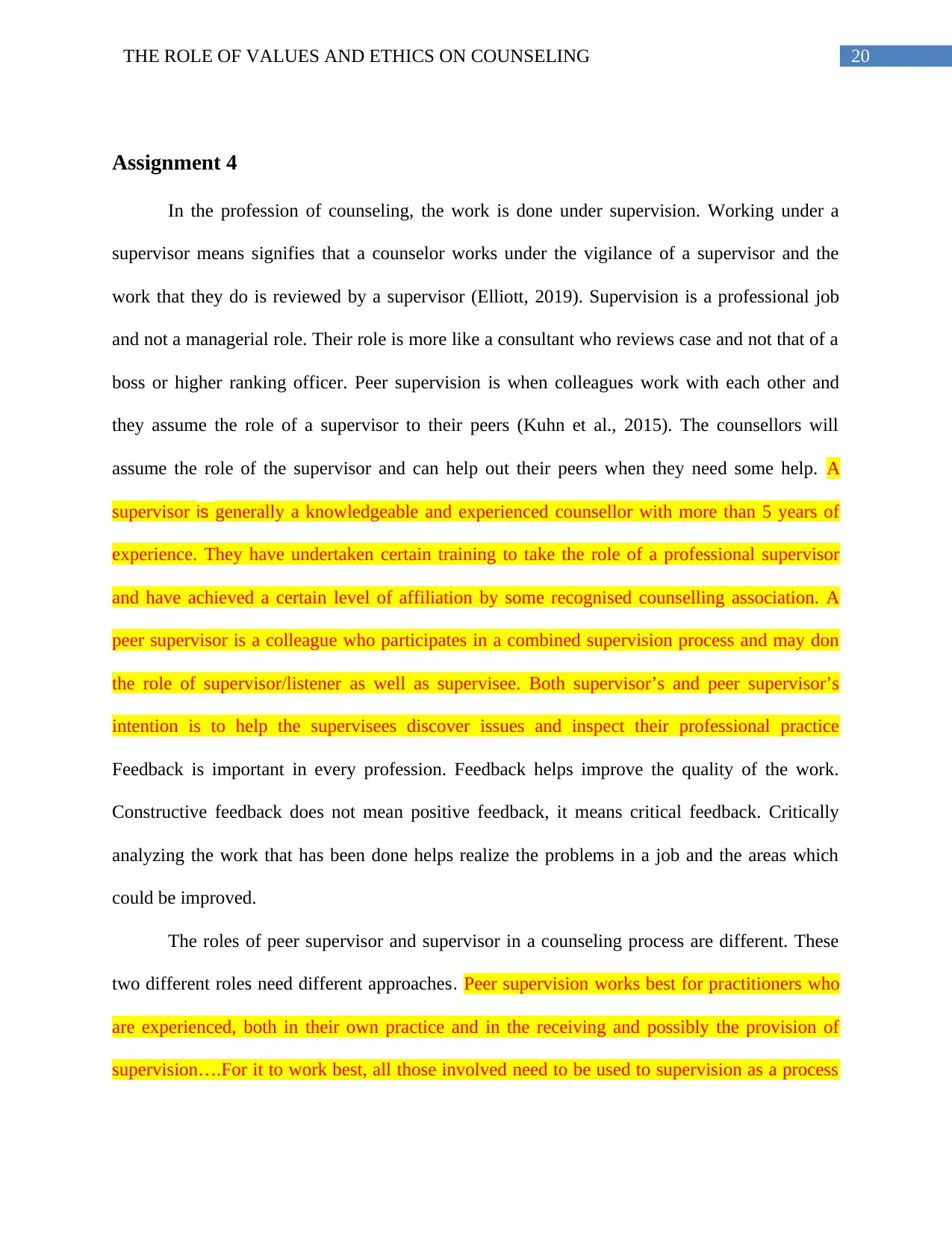
20THE ROLE OF VALUES AND ETHICS ON COUNSELING
Assignment 4
In the profession of counseling, the work is done under supervision. Working under a
supervisor means signifies that a counselor works under the vigilance of a supervisor and the
work that they do is reviewed by a supervisor (Elliott, 2019). Supervision is a professional job
and not a managerial role. Their role is more like a consultant who reviews case and not that of a
boss or higher ranking officer. Peer supervision is when colleagues work with each other and
they assume the role of a supervisor to their peers (Kuhn et al., 2015). The counsellors will
assume the role of the supervisor and can help out their peers when they need some help. A
supervisor is generally a knowledgeable and experienced counsellor with more than 5 years of
experience. They have undertaken certain training to take the role of a professional supervisor
and have achieved a certain level of affiliation by some recognised counselling association. A
peer supervisor is a colleague who participates in a combined supervision process and may don
the role of supervisor/listener as well as supervisee. Both supervisor’s and peer supervisor’s
intention is to help the supervisees discover issues and inspect their professional practice
Feedback is important in every profession. Feedback helps improve the quality of the work.
Constructive feedback does not mean positive feedback, it means critical feedback. Critically
analyzing the work that has been done helps realize the problems in a job and the areas which
could be improved.
The roles of peer supervisor and supervisor in a counseling process are different. These
two different roles need different approaches. Peer supervision works best for practitioners who
are experienced, both in their own practice and in the receiving and possibly the provision of
supervision….For it to work best, all those involved need to be used to supervision as a process
Assignment 4
In the profession of counseling, the work is done under supervision. Working under a
supervisor means signifies that a counselor works under the vigilance of a supervisor and the
work that they do is reviewed by a supervisor (Elliott, 2019). Supervision is a professional job
and not a managerial role. Their role is more like a consultant who reviews case and not that of a
boss or higher ranking officer. Peer supervision is when colleagues work with each other and
they assume the role of a supervisor to their peers (Kuhn et al., 2015). The counsellors will
assume the role of the supervisor and can help out their peers when they need some help. A
supervisor is generally a knowledgeable and experienced counsellor with more than 5 years of
experience. They have undertaken certain training to take the role of a professional supervisor
and have achieved a certain level of affiliation by some recognised counselling association. A
peer supervisor is a colleague who participates in a combined supervision process and may don
the role of supervisor/listener as well as supervisee. Both supervisor’s and peer supervisor’s
intention is to help the supervisees discover issues and inspect their professional practice
Feedback is important in every profession. Feedback helps improve the quality of the work.
Constructive feedback does not mean positive feedback, it means critical feedback. Critically
analyzing the work that has been done helps realize the problems in a job and the areas which
could be improved.
The roles of peer supervisor and supervisor in a counseling process are different. These
two different roles need different approaches. Peer supervision works best for practitioners who
are experienced, both in their own practice and in the receiving and possibly the provision of
supervision….For it to work best, all those involved need to be used to supervision as a process
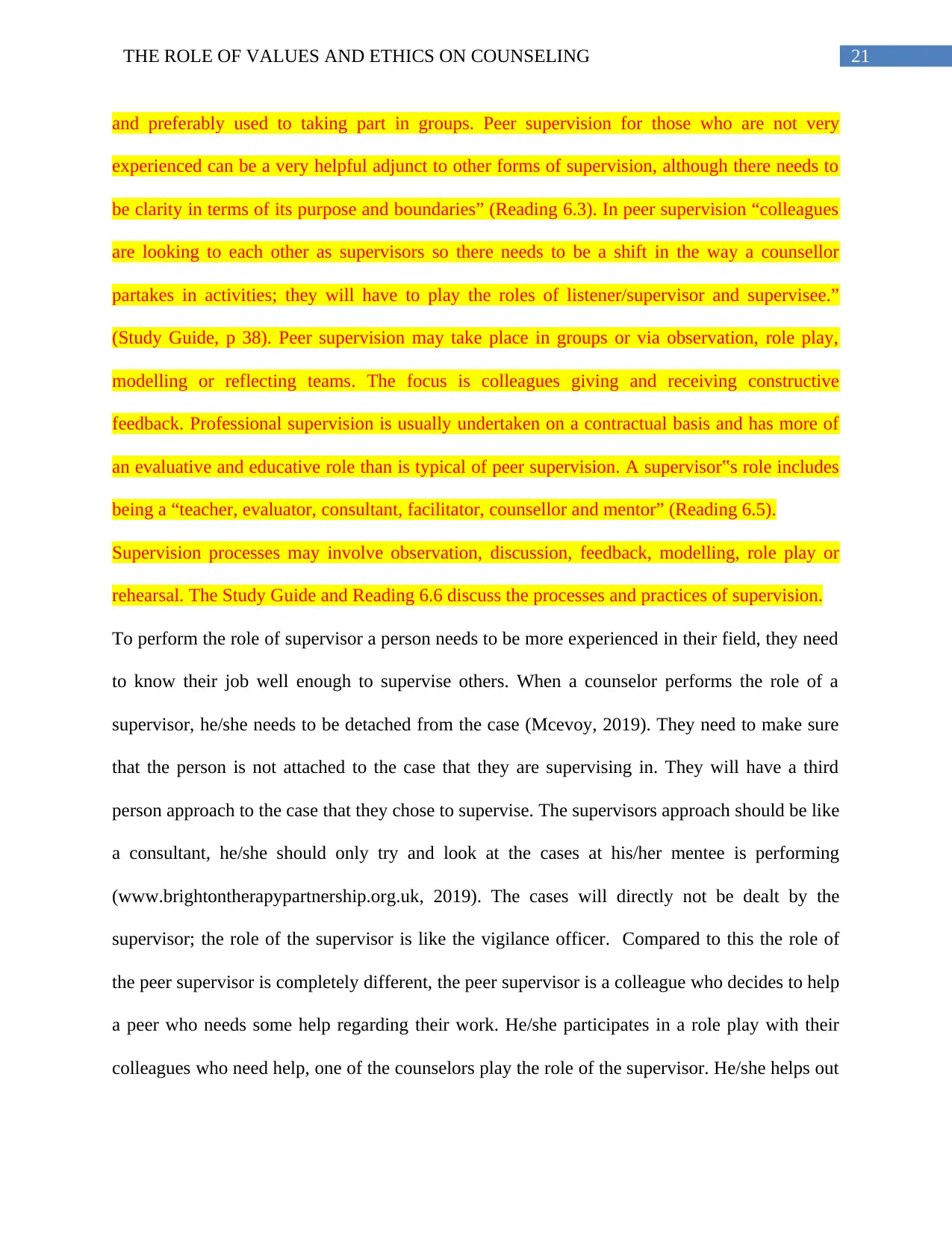
21THE ROLE OF VALUES AND ETHICS ON COUNSELING
and preferably used to taking part in groups. Peer supervision for those who are not very
experienced can be a very helpful adjunct to other forms of supervision, although there needs to
be clarity in terms of its purpose and boundaries” (Reading 6.3). In peer supervision “colleagues
are looking to each other as supervisors so there needs to be a shift in the way a counsellor
partakes in activities; they will have to play the roles of listener/supervisor and supervisee.”
(Study Guide, p 38). Peer supervision may take place in groups or via observation, role play,
modelling or reflecting teams. The focus is colleagues giving and receiving constructive
feedback. Professional supervision is usually undertaken on a contractual basis and has more of
an evaluative and educative role than is typical of peer supervision. A supervisor‟s role includes
being a “teacher, evaluator, consultant, facilitator, counsellor and mentor” (Reading 6.5).
Supervision processes may involve observation, discussion, feedback, modelling, role play or
rehearsal. The Study Guide and Reading 6.6 discuss the processes and practices of supervision.
To perform the role of supervisor a person needs to be more experienced in their field, they need
to know their job well enough to supervise others. When a counselor performs the role of a
supervisor, he/she needs to be detached from the case (Mcevoy, 2019). They need to make sure
that the person is not attached to the case that they are supervising in. They will have a third
person approach to the case that they chose to supervise. The supervisors approach should be like
a consultant, he/she should only try and look at the cases at his/her mentee is performing
(www.brightontherapypartnership.org.uk, 2019). The cases will directly not be dealt by the
supervisor; the role of the supervisor is like the vigilance officer. Compared to this the role of
the peer supervisor is completely different, the peer supervisor is a colleague who decides to help
a peer who needs some help regarding their work. He/she participates in a role play with their
colleagues who need help, one of the counselors play the role of the supervisor. He/she helps out
and preferably used to taking part in groups. Peer supervision for those who are not very
experienced can be a very helpful adjunct to other forms of supervision, although there needs to
be clarity in terms of its purpose and boundaries” (Reading 6.3). In peer supervision “colleagues
are looking to each other as supervisors so there needs to be a shift in the way a counsellor
partakes in activities; they will have to play the roles of listener/supervisor and supervisee.”
(Study Guide, p 38). Peer supervision may take place in groups or via observation, role play,
modelling or reflecting teams. The focus is colleagues giving and receiving constructive
feedback. Professional supervision is usually undertaken on a contractual basis and has more of
an evaluative and educative role than is typical of peer supervision. A supervisor‟s role includes
being a “teacher, evaluator, consultant, facilitator, counsellor and mentor” (Reading 6.5).
Supervision processes may involve observation, discussion, feedback, modelling, role play or
rehearsal. The Study Guide and Reading 6.6 discuss the processes and practices of supervision.
To perform the role of supervisor a person needs to be more experienced in their field, they need
to know their job well enough to supervise others. When a counselor performs the role of a
supervisor, he/she needs to be detached from the case (Mcevoy, 2019). They need to make sure
that the person is not attached to the case that they are supervising in. They will have a third
person approach to the case that they chose to supervise. The supervisors approach should be like
a consultant, he/she should only try and look at the cases at his/her mentee is performing
(www.brightontherapypartnership.org.uk, 2019). The cases will directly not be dealt by the
supervisor; the role of the supervisor is like the vigilance officer. Compared to this the role of
the peer supervisor is completely different, the peer supervisor is a colleague who decides to help
a peer who needs some help regarding their work. He/she participates in a role play with their
colleagues who need help, one of the counselors play the role of the supervisor. He/she helps out
Secure Best Marks with AI Grader
Need help grading? Try our AI Grader for instant feedback on your assignments.
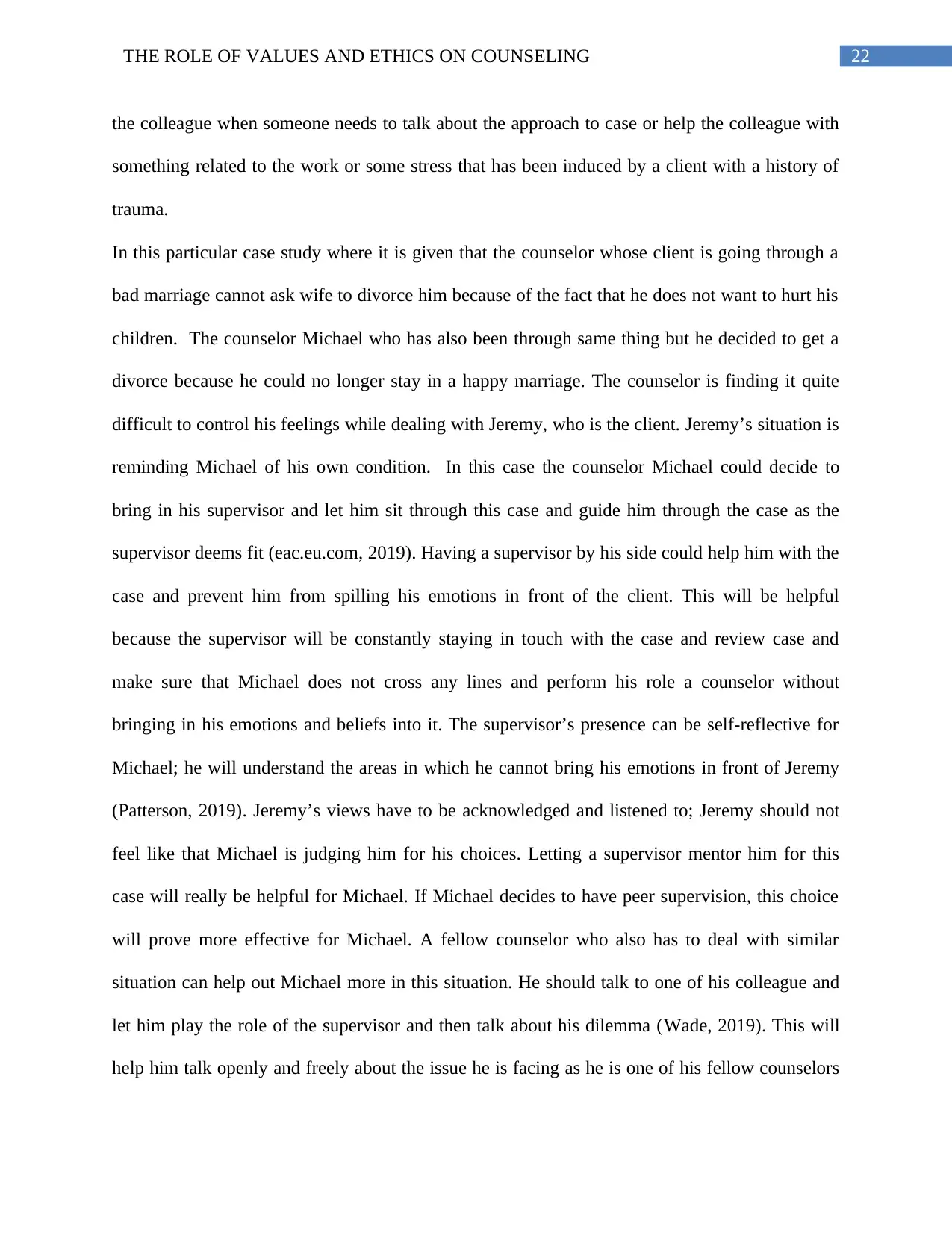
22THE ROLE OF VALUES AND ETHICS ON COUNSELING
the colleague when someone needs to talk about the approach to case or help the colleague with
something related to the work or some stress that has been induced by a client with a history of
trauma.
In this particular case study where it is given that the counselor whose client is going through a
bad marriage cannot ask wife to divorce him because of the fact that he does not want to hurt his
children. The counselor Michael who has also been through same thing but he decided to get a
divorce because he could no longer stay in a happy marriage. The counselor is finding it quite
difficult to control his feelings while dealing with Jeremy, who is the client. Jeremy’s situation is
reminding Michael of his own condition. In this case the counselor Michael could decide to
bring in his supervisor and let him sit through this case and guide him through the case as the
supervisor deems fit (eac.eu.com, 2019). Having a supervisor by his side could help him with the
case and prevent him from spilling his emotions in front of the client. This will be helpful
because the supervisor will be constantly staying in touch with the case and review case and
make sure that Michael does not cross any lines and perform his role a counselor without
bringing in his emotions and beliefs into it. The supervisor’s presence can be self-reflective for
Michael; he will understand the areas in which he cannot bring his emotions in front of Jeremy
(Patterson, 2019). Jeremy’s views have to be acknowledged and listened to; Jeremy should not
feel like that Michael is judging him for his choices. Letting a supervisor mentor him for this
case will really be helpful for Michael. If Michael decides to have peer supervision, this choice
will prove more effective for Michael. A fellow counselor who also has to deal with similar
situation can help out Michael more in this situation. He should talk to one of his colleague and
let him play the role of the supervisor and then talk about his dilemma (Wade, 2019). This will
help him talk openly and freely about the issue he is facing as he is one of his fellow counselors
the colleague when someone needs to talk about the approach to case or help the colleague with
something related to the work or some stress that has been induced by a client with a history of
trauma.
In this particular case study where it is given that the counselor whose client is going through a
bad marriage cannot ask wife to divorce him because of the fact that he does not want to hurt his
children. The counselor Michael who has also been through same thing but he decided to get a
divorce because he could no longer stay in a happy marriage. The counselor is finding it quite
difficult to control his feelings while dealing with Jeremy, who is the client. Jeremy’s situation is
reminding Michael of his own condition. In this case the counselor Michael could decide to
bring in his supervisor and let him sit through this case and guide him through the case as the
supervisor deems fit (eac.eu.com, 2019). Having a supervisor by his side could help him with the
case and prevent him from spilling his emotions in front of the client. This will be helpful
because the supervisor will be constantly staying in touch with the case and review case and
make sure that Michael does not cross any lines and perform his role a counselor without
bringing in his emotions and beliefs into it. The supervisor’s presence can be self-reflective for
Michael; he will understand the areas in which he cannot bring his emotions in front of Jeremy
(Patterson, 2019). Jeremy’s views have to be acknowledged and listened to; Jeremy should not
feel like that Michael is judging him for his choices. Letting a supervisor mentor him for this
case will really be helpful for Michael. If Michael decides to have peer supervision, this choice
will prove more effective for Michael. A fellow counselor who also has to deal with similar
situation can help out Michael more in this situation. He should talk to one of his colleague and
let him play the role of the supervisor and then talk about his dilemma (Wade, 2019). This will
help him talk openly and freely about the issue he is facing as he is one of his fellow counselors
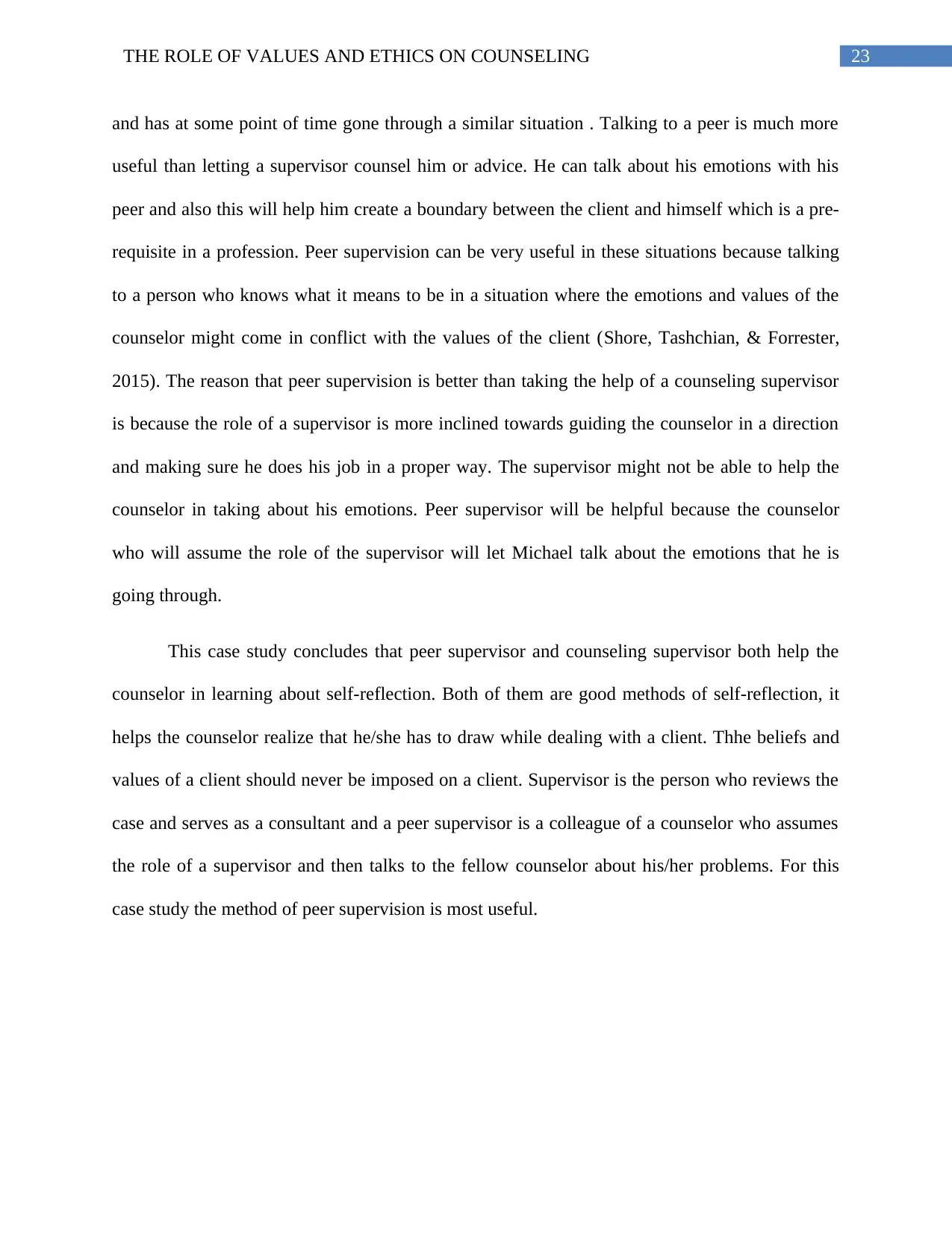
23THE ROLE OF VALUES AND ETHICS ON COUNSELING
and has at some point of time gone through a similar situation . Talking to a peer is much more
useful than letting a supervisor counsel him or advice. He can talk about his emotions with his
peer and also this will help him create a boundary between the client and himself which is a pre-
requisite in a profession. Peer supervision can be very useful in these situations because talking
to a person who knows what it means to be in a situation where the emotions and values of the
counselor might come in conflict with the values of the client (Shore, Tashchian, & Forrester,
2015). The reason that peer supervision is better than taking the help of a counseling supervisor
is because the role of a supervisor is more inclined towards guiding the counselor in a direction
and making sure he does his job in a proper way. The supervisor might not be able to help the
counselor in taking about his emotions. Peer supervisor will be helpful because the counselor
who will assume the role of the supervisor will let Michael talk about the emotions that he is
going through.
This case study concludes that peer supervisor and counseling supervisor both help the
counselor in learning about self-reflection. Both of them are good methods of self-reflection, it
helps the counselor realize that he/she has to draw while dealing with a client. Thhe beliefs and
values of a client should never be imposed on a client. Supervisor is the person who reviews the
case and serves as a consultant and a peer supervisor is a colleague of a counselor who assumes
the role of a supervisor and then talks to the fellow counselor about his/her problems. For this
case study the method of peer supervision is most useful.
and has at some point of time gone through a similar situation . Talking to a peer is much more
useful than letting a supervisor counsel him or advice. He can talk about his emotions with his
peer and also this will help him create a boundary between the client and himself which is a pre-
requisite in a profession. Peer supervision can be very useful in these situations because talking
to a person who knows what it means to be in a situation where the emotions and values of the
counselor might come in conflict with the values of the client (Shore, Tashchian, & Forrester,
2015). The reason that peer supervision is better than taking the help of a counseling supervisor
is because the role of a supervisor is more inclined towards guiding the counselor in a direction
and making sure he does his job in a proper way. The supervisor might not be able to help the
counselor in taking about his emotions. Peer supervisor will be helpful because the counselor
who will assume the role of the supervisor will let Michael talk about the emotions that he is
going through.
This case study concludes that peer supervisor and counseling supervisor both help the
counselor in learning about self-reflection. Both of them are good methods of self-reflection, it
helps the counselor realize that he/she has to draw while dealing with a client. Thhe beliefs and
values of a client should never be imposed on a client. Supervisor is the person who reviews the
case and serves as a consultant and a peer supervisor is a colleague of a counselor who assumes
the role of a supervisor and then talks to the fellow counselor about his/her problems. For this
case study the method of peer supervision is most useful.
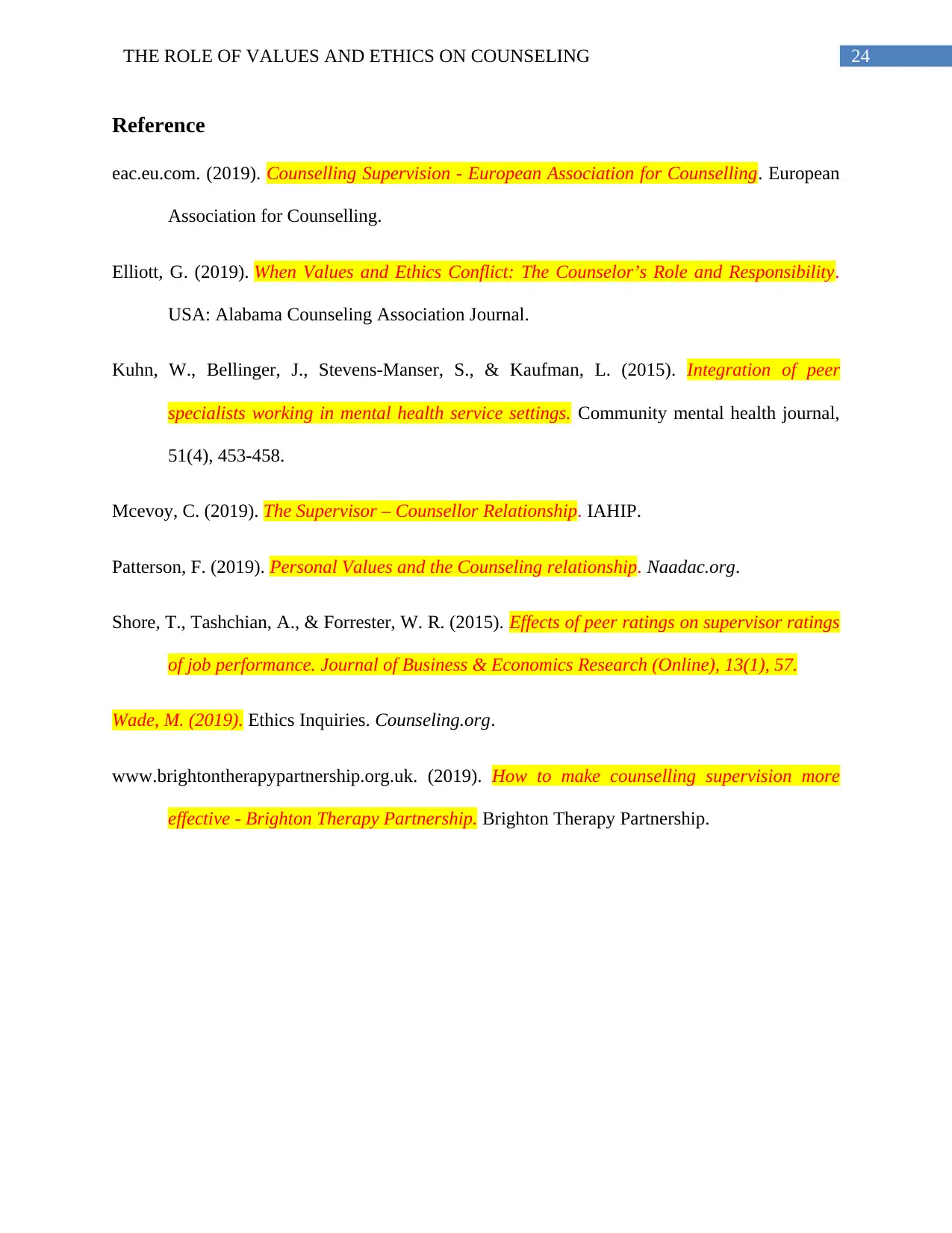
24THE ROLE OF VALUES AND ETHICS ON COUNSELING
Reference
eac.eu.com. (2019). Counselling Supervision - European Association for Counselling. European
Association for Counselling.
Elliott, G. (2019). When Values and Ethics Conflict: The Counselor’s Role and Responsibility.
USA: Alabama Counseling Association Journal.
Kuhn, W., Bellinger, J., Stevens-Manser, S., & Kaufman, L. (2015). Integration of peer
specialists working in mental health service settings. Community mental health journal,
51(4), 453-458.
Mcevoy, C. (2019). The Supervisor – Counsellor Relationship. IAHIP.
Patterson, F. (2019). Personal Values and the Counseling relationship. Naadac.org.
Shore, T., Tashchian, A., & Forrester, W. R. (2015). Effects of peer ratings on supervisor ratings
of job performance. Journal of Business & Economics Research (Online), 13(1), 57.
Wade, M. (2019). Ethics Inquiries. Counseling.org.
www.brightontherapypartnership.org.uk. (2019). How to make counselling supervision more
effective - Brighton Therapy Partnership. Brighton Therapy Partnership.
Reference
eac.eu.com. (2019). Counselling Supervision - European Association for Counselling. European
Association for Counselling.
Elliott, G. (2019). When Values and Ethics Conflict: The Counselor’s Role and Responsibility.
USA: Alabama Counseling Association Journal.
Kuhn, W., Bellinger, J., Stevens-Manser, S., & Kaufman, L. (2015). Integration of peer
specialists working in mental health service settings. Community mental health journal,
51(4), 453-458.
Mcevoy, C. (2019). The Supervisor – Counsellor Relationship. IAHIP.
Patterson, F. (2019). Personal Values and the Counseling relationship. Naadac.org.
Shore, T., Tashchian, A., & Forrester, W. R. (2015). Effects of peer ratings on supervisor ratings
of job performance. Journal of Business & Economics Research (Online), 13(1), 57.
Wade, M. (2019). Ethics Inquiries. Counseling.org.
www.brightontherapypartnership.org.uk. (2019). How to make counselling supervision more
effective - Brighton Therapy Partnership. Brighton Therapy Partnership.
Paraphrase This Document
Need a fresh take? Get an instant paraphrase of this document with our AI Paraphraser

25THE ROLE OF VALUES AND ETHICS ON COUNSELING
1 out of 26
Related Documents
Your All-in-One AI-Powered Toolkit for Academic Success.
+13062052269
info@desklib.com
Available 24*7 on WhatsApp / Email
![[object Object]](/_next/static/media/star-bottom.7253800d.svg)
Unlock your academic potential
© 2024 | Zucol Services PVT LTD | All rights reserved.
![[PDF] INTRODUCTION TO COUNSELING](/_next/image/?url=https%3A%2F%2Fdesklib.com%2Fmedia%2Fimages%2Flp%2F426b6c752ba04c2f873a25cd9bacd611.jpg&w=256&q=75)



